 |
PO Box 9021,
Wilmington, DE 19809, USA
E-mail: font@focusonnature.com
Phone: Toll-free in USA 1-888-721-3555
or 302/529-1876
Website: www.focusonnature.com |
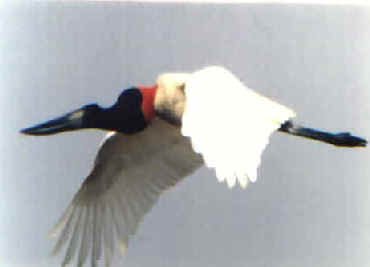 Brazil
Birds
Brazil
Birds
Tinamous to Doves
Noting those found during
Focus On Nature Tours
in Brazil with an (*).
from 1992 thru 2015
during the months of February, March, May,
July, August,
September, October, November
Part 1 of a List of
Brazil Birds with some photos,
compiled by Armas Hill
UPPER RIGHT PHOTO: a JABIRU in flight
Links to Bird Groupings in
This Part of this List:
Tinamous
Rhea
Chachalacas,
Guans, Currassows Screamers & Waterfowl
Penguins & Seabirds
Grebes Storks,
Ibises, Spoonbill Herons,
Egrets, Bitterns
Frigatebirds, Boobies, Cormorants, Anhinga
New
World Vultures Caracaras & Falcons
Kites, Hawks, Eagles
Seriema, Sunbittern Rails, Crakes,
Allies Sungrebe,Trumpeters
Limpkin
Shorebirds
Skuas, Gulls,
Terns, Skimmer Pigeons & Doves
Links to Other Parts of
this List of Brazil Birds:
Part
#2: Macaws to Flycatchers Part
#3: Antshrikes to Woodcreepers
Part #4: Vireos to Grosbeaks
Lists of
Brazilian Birds in:
The Amazon Basin (in Brazil, Ecuador, Venezuela)
Mato
Grosso & Mato Grosso do Sul (including the Pantanal)
Minas
Gerais, in interior south-central Brazil
Rio
Grande do Sul, in southernmost Brazil
Southeast
Brazil (in states of Rio de Janeiro & Sao Paulo)
and
a special list of:
The Rare
& Threatened Birds of Brazil
(with
some photos)
There have been 50 FONT
birding tours in Brazil.
1,065 species of birds have
cumulatively been seen during FONT Brazilian tours.
Generally the taxonomy in this list generally conforms with
that in the Howard & Moore
"Complete Checklist of the Birds of the World", 3rd edition, edited by
Edward Dickinson. More recently some taxonomic order and nomenclature here are from
"Birds of the World - Recommended English Names" by Frank Gill &
Minturn Wright (published in 2006).
Codes:
(BRi): introduced species
in Brazil
(BRe): endemic to Brazil
(BRqe): quasi (or near) endemic to Brazil
(r/BR): a rarity, or vagrant, in Brazil
(t): a globally threatened or
rare species, designated by Birdlife International
(t1): critical
(t2):
endangered
(t3): vulnerable
(nt): a near-threatened
species globally
In the list that
follows, relating to sightings during FONT tours, the Brazilian region or state & the
months are noted.
AF:
the Alta Floresta and Rio Cristalino
areas (mostly Amazonian habitat)
AM: Amazonas state, mostly in the area of Manaus
BR: the area of Brasilia - the federal capital
ES: Espiritu Santo state
IG: the area of Iguacu Falls (in Parana
state)
MN: Minas Gerais state
MS: Mato Grosso do Sul state
MT: Mato Grosso state (excluding Alta Floresta/Rio
Cristalino)
(including the
Pantanal, Chapada dos Guimaraes, Serra das Araras, &
the Jardim da Amazonia in central MT near
the Rio Claro)
NE:
Northeast Brazil (in the states of
Ceara & Piaui)
SE:
Southeast Brazil (in the states
of Rio de Janeiro & Sao Paulo, including areas of Itatiaia
National Park, Cubatao,
Ubatuba, Angra dos Reis,
& Cabo Frio along the coast)
RS:
Rio Grande do Sul - the southernmost state in Brazil
x after the 2-letter code indicates
out-of-range (probable escape)
(ph): species with a photograph in the FONT web-site
Other Links:
Upcoming
FONT Birding & Nature Tours in Brazil
Upcoming FONT Tours Elsewhere
FONT Past Tour Highlights
Photo Galleries &
Narratives from Past FONT Tours
Mammals
& Other Wildlife in Brazil (with some photos)
Butterflies of Brazil &
nearby Argentina, including at Iguazu Falls (with some photos)
Amphibians & Reptiles of Brazil
(with some photos)
Tropical Plants, including some
in South America
Directory of
Photographs in this Web-Site

Bird-List:
TINAMUS
- Solitary Tinamou (nt) (BRqe) (*) ______ IG:sep MN:may,oct SE:oct
Tinamus s. solitarius
Outside Brazil, the Solitary Tinamou has been found during FONT
tours in Argentina.
- Great Tinamou (nt) (*) ______ AF:oct AM:feb,aug
Tinamus major olivascens
Outside Brazil, the Great Tinamou has been found during
FONT tours in Ecuador, Venezuela.
- Gray Tinamou (t3) (*) ______
MT:aug,oct
Tinamus tao kleei
- White-throated Tinamou (nt) ______
Tinamus guttatus
CRYPTURELLUS
- Cinereous Tinamou (*) ______ AF:oct
AM:aug
Crypturellus cinereus (monotypic)
Outside Brazil, the Cinereous Tinamou has been found
during FONT tours in Ecuador.
- Little Tinamou (*) ______ AF:oct AM:feb MN:oct mt
Crypturellus soui albigularis
Outside Brazil, the Little Tinamou has been found during FONT
tours in Ecuador, Venezuela.
- Undulated Tinamou (*) ______ AM:feb MS:mar,aug,sep MT:aug,oct
SE:mar
Crypturellus undulatus vermiculatus
Outside Brazil, the Undulated Tinamou has been found
during FONT tours in Venezuela.
- Yellow-legged Tinamou
(nt) (BRe) (*) ______ MN:sep,oct
Crypturellus n. noctivagus
- Brown Tinamou (*) ______ af MN:may,sep,oct RS:oct SE:mar,aug,oct
Crypturellus o.obsoletus (mn,rs & se)
Crypturellus obsoletus griseiventris (af)
Outside Brazil, the Brown Tinamou has been found during FONT
tours in Venezuela.
- Small-billed Tinamou (*) ______ MN:may MS:mar mt
Crypturellus parvirostris (monotypic)
- Brazilian Tinamou (*) ______ AF:oct
Crypturellus strigulosus (monotypic)
- Tataupa Tinamou (*) ______ ig MN:oct mt
Crypturellus t. tataupa
- Red-legged Tinamou ______
(in far-northern Brazil)
Crypturellus erythropus
- Gray-legged Tinamou (nt) ______
(in far-northwestern Brazil)
Crypturellus duidae
- Black-capped Tinamou (nt) ______
(in western Amazonian Brazil)
Crypturellus atrocapillus
- Bartlett's Tinamou ______
(in western Amazonian Brazil)
Crypturellus bartletti
Outside Brazil, the Bartlett's Tinamou has been found during FONT
tours in Ecuador.
- Rusty Tinamou ______ (in western Amazonian Brazil)
Crypturellus brevirostris
- Barred Tinamou ______
(in
far northwestern Brazil)
Crypturellus cassiquiare
- Variegated Tinamou ______
Crypturellus variegatus
Outside Brazil, the Variegated Tinamou has been found during FONT
tours in Ecuador, Venezuela.
RHYNCHOTUS
- Red-winged Tinamou (*) ______ br MN:sep,oct MS:aug MT:mar,oct
Rhynchotus r. rufescens
Outside Brazil, the Red-winged Tinamou has been found during
FONT tours in Argentina.
NOTHURA
- Spotted Nothura (ph) (*) ______ br MN:mar,sep,oct MS:mar mt
RS:jul,oct
Nothura m. maculosa (mn,mt,rs)
Nothura maculosa major (br)
Outside Brazil, the Spotted Nothura has been found during FONT
tours in Argentina, Uruguay.
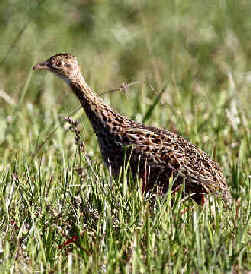
A Spotted Nothura
photographed during a FONT Brazil
Tour
in Rio Grande do Sul in October 2009
- White-bellied Nothura (*) ______ mt
Nothura boraquira (monotypic)
- Lesser Nothura (t3) (*) ______
mn
Nothura minor
TAONISCUS
- Dwarf Tinamou (t3) ______
Taoniscus nanus (the single member of its genus)
RHEA
- Greater Rhea (nt) (ph) (*) ______ MN:sep MS:mar,aug,sep MT:mar,aug,oct
RS:jul,oct
Rhea a. americana (mn)
Rhea americana araneipes (mt)
Rhea americana intermedia (rs)
(the single member of its genus)
Outside Brazil, the Greater Rhea has been found during FONT tours
in Argentina.
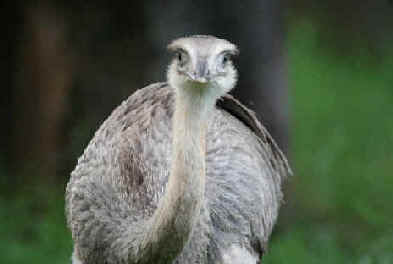
A Greater Rhea photographed during a FONT
Brazil Tour
ORTALIS
- Little Chachalaca (*) ______ AM:feb,aug (this species, north of
the Amazon, was conspecific with the Speckled, Scaled, &
Chestnut-headed Chachalacas; was called Variable Chachalaca when combined)
Ortalis motmot ruficeps
Outside Brazil, the Little Chachalaca has been found during
FONT tours in Venezuela.
- Chestnut-headed Chachalaca (*) ______ af
MT:aug,oct (this
species, south of the Amazon, was conspecific with the Speckled,
Scaled,
& Little Chachalacas;
was called
Variable Chachalaca
when combined)
Ortalis guttata (monotypic)
- Scaled Chachalaca (*) ______ MN:aug
Ortalis squamata (monotypic)
- Chaco Chachalaca (ph) (*) ______ MS:mar,aug,sep,oct MT:aug
Ortalis canicollis pantanalensis
Outside Brazil, the Chaco Chachalaca has been found during FONT
tours in Argentina.
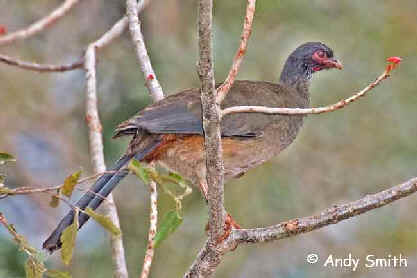
A Chaco Chachalaca photographed during a
FONT Brazil
in the Pantanal
- Buff-browed Chachalaca (BRe) ______ (in northern Brazil)
Ortalis superciliaris
PENELOPE
- Rusty-margined Guan (*) ______ ig MN: may,sep,oct MS:mar,aug,oct
Penelope superciliaris jacupemba
Outside Brazil, the Rusty-margined
Guan has been found during FONT tours in Argentina.
- Dusky-legged Guan (ph) (*) ______ IG:aug,sep MN:may,sep,oct RS:jul,oct
SE:aug,oct
Penelope o. obscura
Outside Brazil, the Dusky-legged Guan has been found during
FONT tours in Argentina.
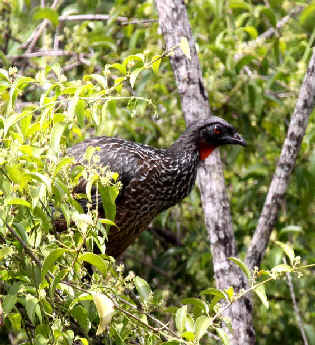
A Dusky-legged Guan photographed during a
FONT tour in Brazil
- Spix's Guan (*) ______ AF:oct AM:aug MT:aug
Penelope j. jacquacu
Outside Brazil, the Spix's Guan has been found during
FONT tours in Ecuador, Venezuela.
- Chestnut-bellied Guan (t2) (BRe) (*) ______
MT:aug
Penelope ochrogaster (monotypic)
- Marail Guan (*) ______ AM:feb
Penelope marial
- White-browed Guan (nt) (BRe) ______
(in northeast Brazil)
Penelope jacucaca
- White-crested Guan (t3) (BRe) ______
(in eastern Amazonian Brazil)
Penelope pileata
PIPILE
- Common
Piping Guan (t3) (*) ______ AF:oct
MS:mar,aug,sep,oct MT:aug (includes both
"Blue-throated Piping Guan" and "Red-throated Piping
Guan")
Pipile cumanensis grayi (ms,mt)
Pipile cumanensis nattereri (af)
Outside Brazil, the Common Piping Guan has been found during
FONT tours in Ecuador, Venezuela.
- Black-fronted Piping Guan (t2) (BRqe) (*) ______
IG:jul SE:oct
Pipile jacutinga (monotypic)
Outside Brazil, the Black-fronted Piping Guan has been found
during FONT tours in
Argentina.
CRAX
- Bare-faced Curassow (*) ______ af,br MS:mar,aug,sep,oct MT:aug
Crax fasiolata (br,ms,mt)
- Belem Curassow (t1) (*)
______ af
Crax pinima
Crax pinima, which has been called "Natterer's Bare-faced
Curassow", was conspecific with Crax fasiolata
(above).
As of 2014: A tiny captive population of Crax pinima exists, but
there have been no confirmed records of it in the wild since 1978.
According to Birdlife International, "Any remaining wild population
must be extremely small, and is likely to still be declining."
Thus, now their classification of "critically endangered".
Crax pinima
has been restricted to Maranhao and Para in northeastern Amazonia, therefore
being a Brazilian endemic.
It is said now to be extinct in around Belem, in Para.
It may survive in western Maranhao at the Reserva Biologica do Gurupi and in
nearby areas.
The species was not found recently during extensive fieldwork around
Paragominas in eastern Para (2003)>
During other even extensive fieldwork in Para from 1998 to 2009, the only
reports came from local people who said that the species occurs in very low
numbers in the Agropalma Group Forrestal Reserves in Tailandia, where it was
said to be even more rare than Mitu tuberosum.
In 2009, 5 individuals (3 females and 2 males) were seized in illegal trade
and were sent to a conservation breeding
center.
A female Belem Curassow, or "Nattterer's Bare-faced Curassow" as
it was known at the time, was seen during a FONT tour in the 1990s, along
the riverbank of the Rio Cristalino, near Alta Floresta, in northern Mato
Grosso, Brazil.
- Black Curassow (t3) ______
(in
far-northern Brazil)
Crax alector
Outside Brazil, the Black Curassow has been found during FONT tours
in Venezuela.
- Wattled Curassow (t3) ______
(in
western Amazonian Brazil)
Crax globulosa
- Red-billed Curassow (t2) ______
Crax blumenbachi
MITU
- Razor-billed Curassow (*) ______ AF:oct mt
Mitu tuberosum (was considered conspecific
with the Alagoas
Curassow of eastern Brazil that's now either extinct or nearly so in the wild)
- Alogoas Curassow ______
Mitu mitu
- Crestless Curassow (nt) ______
(in far-northern Brazil)
Mitu tomentosum
NOTHOCRAX
- Nocturnal Curassow
______ (in western Amazonian Brazil)
Nothocrax
urumutum
Outside Brazil, the Nocturnal Curassow has been found during
FONT tours in Ecuador.
ODONTOPHURUS
- Marbled Wood Quail (nt) (*) ______ AF:oct MT:oct
Odontophorus g. gujanensis
Outside Brazil, the Marbled Wood Quail has been found
during FONT tours in Ecuador.
- Spot-winged Wood Quail (*) ______ MN:may,sep,oct se
Odontophorus capueira (monotypic)
Outside Brazil, the Spot-winged Wood Quail has been
found during FONT tours in Argentina.
- Starred Wood Quail ______
Odontophorus stellatus
COLINUS
- Crested Bobwhite
______ (in far-northern Brazil)
Colinus cristatus
Outside Brazil, the Crested
Bobwhite has been found during FONT tours in Venezuela.
CHAUNA
- Southern Screamer (ph) (*) ______
MS:mar,aug,sep,oct MT:aug RS:jul,oct
Chauna torquata (monotypic)
Outside Brazil, the Southern Screamer has been found during FONT
tours in Argentina, Uruguay.
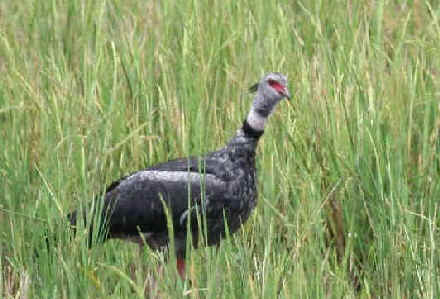
A Southern Screamer photographed during
a FONT Brazil Tour
in Rio Grande do Sul
ANHIMA
- Horned Screamer (*)
______ AM:feb
Anhima cornuta
Outside Brazil, the Horned Screamer has been found during FONT tours
in Ecuador, Venezuela.
CYGNUS
- Black-necked Swan (ph) (*) ______
RS:oct
Cygnus melancoryphus (monotypic)
Outside Brazil, the Black-necked Swan has been found during FONT tours in
Argentina, Chile.
COSCOROBA
- Coscoroba Swan (ph) (*) ______
RS:oct
Coscoroba coscoroba (monotypic, and the single member of its
genus)
Outside Brazil, the Coscoroba Swan has been found during FONT tours in
Argentina, Chile.
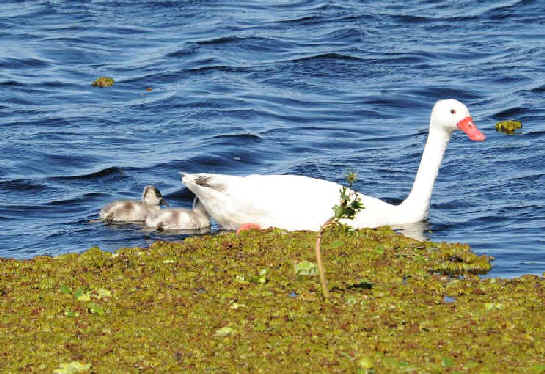
A Coscoroba Swan
with 2 cygnets, photographed during the
FONT tour
in Rio Grande do Sul in October 2010
(photo by Bob Enever)
CAIRINA
- Muscovy Duck (ph) (*) ______ AF:oct AM:feb IG:sep MN:mar,sep,oct MS:mar,aug,sep,oct
MT:aug,oct
Cairina moschata (monotypic, and the single member of its
genus)
Outside Brazil, the Muscovy Duck has been found during FONT
tours in Argentina, Ecuador, Venezuela.
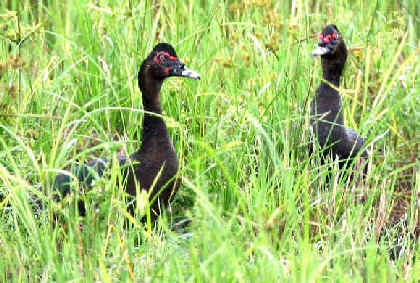
Wild Muscovy Ducks photographed during a
FONT Brazil Tour in Mato Grosso do Sul
DENDROCYGNA
- White-faced Whistling Duck (ph) (*)
______ af MN:may,mar,oct MS:mar,aug,sep
mt RS:oct SE:jul,aug,oct
Dendrocygna viduata (monotypic)
Outside Brazil, the White-faced Whistling Duck has been
found during FONT tours in Argentina, Uruguay, Venezuela.
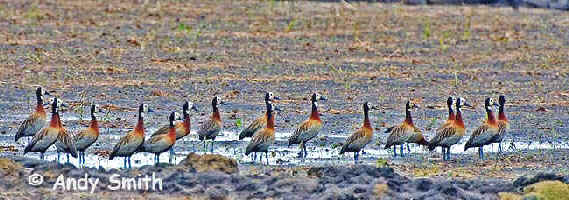
White-faced Whistling Ducks
photographed during a FONT Brazil Tour in Mato Grosso do Sul
- Black-bellied Whistling Duck
(ph) (*) ______ af AM:aug MN:mar
MS:mar,aug,sep mt
Dendrocygna autumnalis discolor
Outside Brazil, the Black-bellied Whistling Duck has
been found during FONT tours in Argentina, Venezuela.
- Fulvous Whistling Duck (*) ______ MS:aug
mt RS:oct SE:aug,oct
Dendrocygna bicolor
(monotypic)
Outside Brazil, the Fulvous Whistling Duck has been
found during FONT tours in Argentina, Uruguay, Venezuela.
SARKIDIORNIS
- Comb Duck (ph) (*) ______ ig MS:aug RS:oct SE:aug (was conspecific with what's now the
Knob-billed Duck of Africa & Asia)
Sarkidiornis sylvicola (monotypic)
Outside Brazil, the Comb Duck has been found during FONT tours in
Argentina, Venezuela.
NEOCHEN
- Orinoco Goose (nt) ______
Neochen jubata (the single member of its genus)
Outside Brazil, the Orinoco Goose
has been found during FONT tours in Venezuela.
ANAS
- White-cheeked Pintail (ph) (*) ______
SE:jul,aug,oct
Anas bahamensis rubriostris
Outside Brazil, the White-cheeked Pintail has been found
during FONT tours in Argentina, Chile, Venezuela.
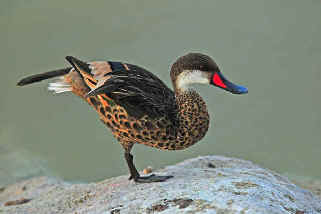
White-cheeked Pintail
(photo by Marie Grenouillet)
- Yellow-billed Pintail (ph) (*) ______ RS:jul,oct
SE:oct
Anas georgica spinicauda
Outside Brazil, the Yellow-billed Pintail has been found
during FONT tours in Argentina, Chile.
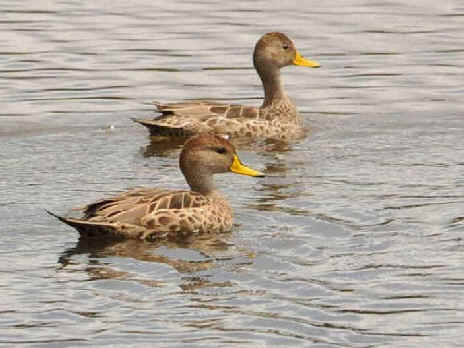
Yellow-billed Pintails photographed
during the FONT tour
in Rio Grande do Sul in October 2010
(photo by Bob Enever)
- Speckled Teal (ph) (*) ______
RS:jul,oct
Anas f. flavirostris
Outside Brazil, the Speckled Teal has been found during FONT
tours in Argentina, Chile.
- Silver Teal (ph) (*) ______
RS:jul,oct
Anas v. versicolor
Outside Brazil, the Silver Teal has been found during FONT
tours in Argentina, Chile.
- Chiloe Wigeon (ph) ______
(in
far-southern Brazil)
Anas sibilatrix
Outside Brazil, the Chiloe Wigeon has
been seen during a FONT tours in Argentina, Chile, Paraguay.
In Paraguay (during a Brazil tour), there was a small flock on
the Paraguayan side of the river that is the Brazil-Paraguay border, not far
from Foz do Iguacu, in August 2008.
- Cinnamon Teal
______ (in far-southern Brazil)
Anas cyanoptera
Outside Brazil, the Cinnamon Teal has been found during FONT tours in
Argentina, Chile.
- Blue-winged Teal (ph)
______
Anas discors
Outside Brazil, the Blue-winged Teal has been found during FONT tours in
Venezuela.
- Red Shoveler (ph) (*) ______ RS:oct
Anas platalea
Outside Brazil, the Red Shoveler has been found during FONT tours in
Argentina, Chile.
NETTA
- Rosy-billed Pochard (ph) (*) _____
RS:oct se (another name has been "Rosybill")
Netta peposaca (monotypic)
Outside Brazil, the Rosy-billed Pochard has been found during
FONT tours in Argentina, Chile, Uruguay.
- Southern Pochard (*) ______ SE:aug
Netta e. erythrophthalma
CALLONETTA
- Ringed Teal (ph) (*) ______
RS:oct
Callonetta leucophrys (monotypic,
and the single member of its genus)
Outside Brazil, the Ringed Teal has been found during FONT tours in
Argentina.
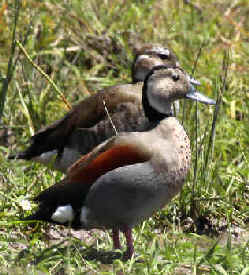
A pair of Ringed Teal photographed during a FONT Brazil tour in Rio Grande do Sul in October
2009
AMAZONETTA
- Brazilian Teal (ph) (*) ______
af br MN:mar,may,sep,oct MS:mar,aug MT:oct
RS:jul,oct SE:jul,aug,oct
Amazonetta brasiliensis ipecutiri (the single member of its genus)
Outside Brazil, the Brazilian Teal has been found during FONT tours
in Argentina, Uruguay, Venezuela.
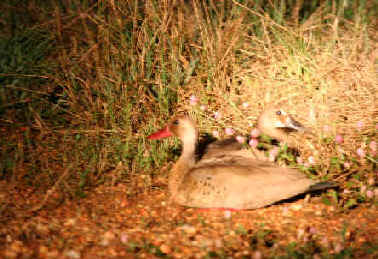
A Brazilian Teal after dark roosting by the
side of a road.
Photographed during a FONT Brazil Tour in Mato Grosso do Sul
MERGUS
- Brazilian Merganser (t1) (BRqe) (ph) (*)
______ MN:mar,aug,sep,oct
Mergus octosetaceus (monotypic)
The very rare BRAZILIAN MERGANSER has been seen during 6 FONT
tours in Brazil:
in March 1997, October 1998, August 2002, October 2003, September 2006, and
March 2008.
Each time, our sightings have been in a remote part of western Minas Gerais.
Regarding the BRAZILIAN MERGANSER, go to: RARE
BIRDS of BRAZIL
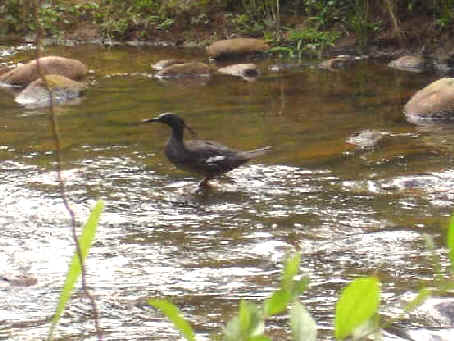
The very rare Brazilian Merganser
HETERONETTA
- Black-headed Duck (*) ______ RS:oct
(the only brood-parasitic duck in the world)
Heteronetta atricapilla (monotypic, and the single member of
its genus)
Outside Brazil, the Black-headed Duck has been seen during FONT tours
in Argentina, Chile.
OXYURA
- Lake Duck ______
(in
far-southern Brazil)
Oxyura vittata
Outside Brazil, the Lake Duck has been found during FONT tours in
Argentina, Chile.
NONONYX
- Masked Duck (*) ______ SE:aug
Nononyx (formerly Oxyura)
dominica (monotypic, and the single member of its
genus)
Outside Brazil, the Masked Duck has been found during
FONT tours in Argentina, Venezuela.
SPHENISCUS
- Magellanic Penguin (nt) (ph) (*) ______
RS:oct SE:aug
Spheniscus mendiculus (monotypic)
Outside Brazil, the Magellanic Penguin has been found during FONT
tours in Argentina, Chile.
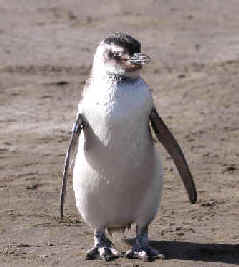
A Magellanic Penguin on a beach in Rio
Grande do Sul, Brazil,
photographed during the October 2009 FONT
tour.
APTENODYTES
- King Penguin (ph) ______ (r/BR)
Aptenodytes patagonicus
The King Penguin has been found, very
rarely, along the southern Brazilian seacoast
EUDYPTES
- Rockhopper Penguin (t3) ______ (r/BR)
Eudyptes chrysocome
The Rockhopper Penguin has
been found, very rarely, along the far-southern Brazilian seacoast. In Rio
Grande do Sul at Mostardes, one was found dead in August 1980.
- Macaroni Penguin (t3) ______
(r/BR)
Eudyptes
chrysolophus
The Marconi Penguin has
occurred as a vagrant along the seacoast of far-southern Rio Grande do Sul.
DIOMEDEA
- Wandering Albatross (t3) (ph) ______
(offshore)
Diomedea exulans
- Northern Royal Albatross (t2) ______
(offshore)
Diomedea sanfordii
Outside Brazil, the Northern Royal
Albatross has been found offshore during FONT tours in
Chile.
- Southern Royal
Albatross (t3) (ph) ______ (offshore)
Diomedea epomophora
Outside Brazil, the Southern Royal Albatross has been found offshore
during FONT tours in Chile.
THALASSARCHE
- Black-browed Albatross (nt) (ph) (*) ______
RS:jul,oct
(seen from shore)
Thalassarche (has been
Diomedea)
melanophrys
Outside Brazil, the Black-browed Albatross has been found during FONT tours
in Argentina, Chile.
- Atlantic Yellow-nosed Albatross (nt) ______
(offshore)
Thalassarche
chlororhynchos
- Shy Albatross (nt) (ph) ______
(offshore)
Thalassarches cauta
Outside Brazil, the Shy Albatross
has been found offshore during FONT tours in Chile.
- Gray-headed Albatross (t3) ______
(offshore)
Thalassarches chrysostoma
Outside Brazil, the Gray-headed
Albatross has been found offshore during FONT tours in Chile.
PHOEBETRIA
- Sooty Albatross (t3) ______
(offshore)
Phoebetria fusca
- Light-mantled Albatross (nt) ______ (offshore)
Phoebetria palpebrata
MACRONECTES
- Southern Giant Petrel (ph) ______
Macronectes giganteus
Outside Brazil, the Southern Giant
Petrel has been found during FONT tours in Argentina, Chile.
- Northern Giant Petrel (nt) (ph) ______
Macronectes halli
Outside Brazil, the Northern Giant
Petrel has been found during FONT tours in Chile.
FULMARUS
- Southern Fulmar (ph) ______
Fulmarus glacialoides
Outside Brazil, the Southern Fulmar
has been found during FONT tours in Argentina, Chile.
HALOBAENA
- Blue Petrel ______ (r/BR)
Halobaena caerulea (the single member of its genus)
There is a Brazilian record for the Blue
Petrel from the Rio de Janiero seacoast.
PACHYPTILA
- Broad-billed Prion
______ (r/BR) (in far-southern Brazil, coastally & offshore)
Pachyptila vittata
The closely-related Antarctic
Prion has been considered conspecific with the Broad-billed Prion.
- Slender-billed Prion
______ (in far-southern Brazil, coastally & offshore; the most
common prion in Brazilian waters)
Pachyptila belcheri
Outside Brazil, the Slender-billed Prion has been found during FONT
tours in Chile.
DAPTION
- Cape Petrel (ph) ______ (also
called Pintado)
Daption capense
Outside Brazil, the Cape Petrel has
been found during FONT tours in Chile.
APHRODROMA
- Kerguelen Petrel ______
Aphrodroma (or
Lugensa) brevirostris (the single member
of its genus)
PTERODROMA
- Trindade Petrel (t3) ______
Pterodroma arminjoniana
Outside Brazil, the Trindade Petrel has been found during FONT
tours in the US offshore from North Carolina.
- Soft-plumaged Petrel ______
Pterodroma mollis
- Great-winged Petrel ______
Pterodroma macroptera
- Kermadec Petrel ______
Pterodroma neglecta
The Kermadec Petrel has
recently been found in Brazilian offshore waters. This species is not common
in the South Atlantic Ocean.
-
White-headed Petrel ______
Pterodroma lessonii
- Atlantic Petrel (t3) ______
Pterodroma incerta
- Black-capped Petrel (t2) (ph) ______
Pterodroma hasitata
Outside Brazil, the Black-capped
Petrel has been found during FONT tours in Puerto Rico and in the US
offshore from North Carolina.
PROCELLARIA
- White-chinned Petrel (t3) (*) ______
RS:oct
(seen from shore)
Procellaria a. aequinoctialis
Outside Brazil, the White-chinned Petrel has been found during FONT
tours in Argentina, Chile.
- Spectacled Petrel (t1) ______ (has been
split from the White-chinned Petrel)
Procellaria conspicillata
- Gray Petrel (nt) ______ (also
called Pediunker)
Procellaria
cinerea
Outside Brazil, the Gray Petrel has
been found offshore during FONT tours in Chile.
CALONECTRIS
- Cory's Shearwater (ph)
______
Calonectris diomedea
Outside Brazil, the Cory's
Shearwater has been found during FONT tours in the Canary Islands, and
in the US offshore from New Jersey, North Carolina.
- Cape Verde Shearwater ______
Calonectris edwardsii
PUFFINUS
- Manx Shearwater (*) ______ RS:oct
se
Puffinus puffinus
Outside Brazil, the Manx Shearwater has been found during FONT
tours in Argentina, Iceland.
- Greater Shearwater (ph) ______ (seasonally offshore)
Puffinus gravis
- Sooty Shearwater (ph) ______ (offshore, from May to November can be common)
Puffinus griseus
Outside Brazil, the Sooty Shearwater has been found during FONT tours
in Chile.
- Audubon's Shearwater (ph) ______ (breeds, in apparently small numbers, off the eastern Brazilian
seacoast)
Puffinus iherminieri
A bird once captured on the Fernando da Noronha islands, offshore from
northeast Brazil, and said at the time to be the Little Shearwater, Puffinus
assimilis boydi, has since become, due to a taxonomic change, Puffinus
iherminieri boydi, a race of the Audubon's Shearwater. P. h. boydii
breeds
on the Cape Verde Islands off the west coast of
Africa.
BULWERIA
- Bulwer's Petrel (ph) ______
Bulweria bulwerii
Outside Brazil, the Bulwer's
Petrel has been seen during FONT tours in the Canary Islands, Japan, and
in the US offshore from North Carolina.
OCEANITES
- Wilson's Storm Petrel (ph) (*) ______
RS:oct
(seen by the end of a long jetty 3km out at sea)
Oceanites oceanicus
Outside Brazil, the Wilson's Storm Petrel has been found during
FONT tours in Chile.
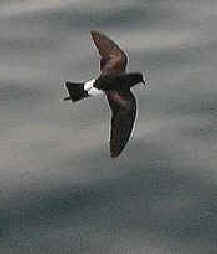
Wilson's Storm-Petrel
OCEANODROMA
- Leach's Storm Petrel ______
Oceanodroma leucorhoa
FREGETTA
- White-bellied Storm Petrel ______
Fregetta grallaria
- Black-bellied Storm Petrel ______
Fregetta tropica
PELAGODROMA
- White-faced Storm Petrel (ph) ______
Pelagodroma marina
(the single member of its genus)
PELECANOIDES
- Magellanic Diving Petrel ______
(one was found, on the beach, at Cassino in Rio Grande do Sul in August
1984)
Pelecanoides
magellani
Outside Brazil, the Magellanic Diving
Petrel has been found during FONT tours in Argentina, Chile.
PODILYMBUS
- Pied-billed Grebe (*) ______ MN:may,sep,oct MS:mar,aug RS:jul,oct
SE:jul,aug,oct
Podilymbus podiceps antarcticus
Outside Brazil, the Pied-billed Grebe has been found during
FONT tours in Argentina, Chile, Venezuela.
TACHYBABTUS
- Least Grebe (ph) (*) ______ AM:feb MN:may,sep,oct MS:aug,oct mt
SE:aug,oct
Tachybabtus
(formerly Podiceps) dominicus speciesus
Outside Brazil, the Least Grebe has been found during FONT tours in
Argentina, Venezuela.
ROLLANDIA
- White-tufted Grebe (*) ______
RS:oct
Rollandia
(formerly Podiceps) rolland chilensis
Outside Brazil, the White-tufted Grebe has been found during FONT
tours in Argentina, Chile.
PODICEPS
- Great Grebe (*) ______
RS:oct
Podiceps m. major
Outside Brazil, the Great Grebe has been found during FONT tours in
Argentina, Chile.
- Silvery Grebe ______ (recently reported in far-southern Brazil from mid-October to early
November)
Podiceps occipitalis
Outside Brazil, the Silvery Grebe has
been found during FONT tours in Argentina, Chile.
PHOENICOPTERUS
- American
Flamingo (ph) ______ (in far-northern Brazil)
Phoenicopterus ruber
Outside Brazil, the American Flamingo has been found during FONT torus in
the Dominican Republic, Mexico, Venezuela.
- Chilean Flamingo (nt) (ph)
______ (in far-southern Brazil)
Phoenicopterus chilensis
Outside Brazil, the Chilean Flamingo has been found during FONT tours in
Argentina, Chile.
PHOENICOPARRUS
- Andean Flamingo
______ (r/BR)
Phoenicoparrus andinus
The Andean Flamingo has occurred as a rarity, in far-southern
Brazil.
Outside Brazil, the Andean Flamingo has been found during FONT tours
in Argentina, Chile.
JABIRU
- Jabiru (ph) (*) ______ af MS:mar,aug,sep,oct MT:aug
Jabiru mycteria (monotypic, and the single member of its genus)
Outside Brazil, the Jabiru has been found during FONT tours in
Argentina, Belize, Costa Rica, Honduras, Venezuela.
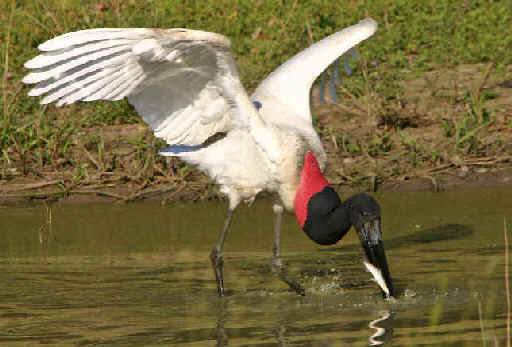
A Jabiru photographed during a FONT tour in
Brazil in the Panatnal
CICONIA
- Maguari Stork (ph) (*) ______
MS:mar,aug,sep mt RS:jul,oct
Ciconia maguari (monotypic)
Outside Brazil, the Maguari Stork has been found during FONT tours in
Argentina, Uruguay, Venezuela.
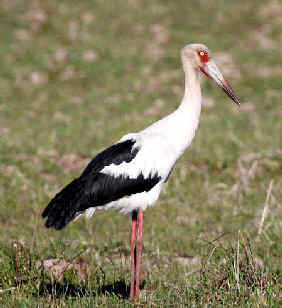
A Maguari Stork photographed during a FONT
tour in Rio Grande do Sul
MYCTERIA
- Wood Stork (ph) (*) ______ af MN:aug MS:mar,aug,sep MT:mar,aug
RS:oct
Mycteria americana (monotypic)
Outside Brazil, the Wood Stork has been found during
FONT tours in Argentina, Uruguay, Venezuela.
EUDOCIMUS
- Scarlet Ibis (ph) (*) ______
SE:mar,jul,aug,oct
Eudocimus ruber (monotypic)
Outside Brazil, the Scarlet Ibis has been found during FONT
tours in Venezuela.
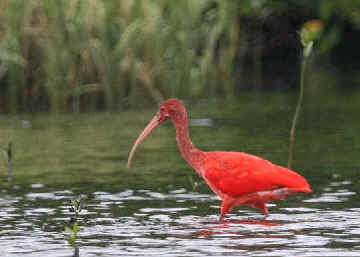
A Scarlet Ibis photographed during a FONT
tour
in southeast Brazil, where the species is local
THERISTICUS
- Buff-necked Ibis (ph) (*) ______
MN:mar,aug,sep,oct MS:mar,aug,sep,oct MT:mar,aug
RS:jul,oct
Theristicus caudatus hyperorius
Outside Brazil, the Buff-necked Ibis has been found
during FONT tours in Argentina, Venezuela.
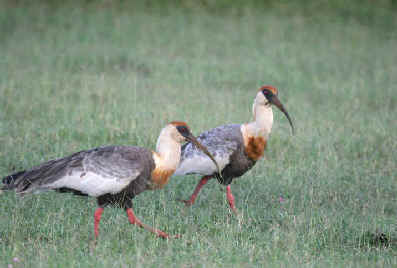
Buff-necked Ibis photographed during a
FONT Brazil Tour
- Plumbeous Ibis (ph) (*) ______ MS:mar,aug,sep,oct MT:aug RS:oct
Theristicus caerulescens (monotypic)
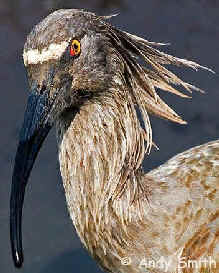
Plumbeous Ibis photographed
during a FONT Brazil Tour
CERCIBIS
- Sharp-tailed Ibis
______ (in northern Brazil & western
Amazonian Brazil)
Cercibis oxycerca
Outside Brazil, the Sharp-tailed Ibis
has been found during FONT tours in Venezuela.
MESEMBRINIBIS
- Green Ibis (*) ______ AF:oct AM:feb,aug br mn MS:mar,aug,sep,oct
MT:aug,oct
Mesembrinibis cayennensis (monotypic, and the single member of its genus)
Outside Brazil, the Green Ibis has been found during FONT tours
in Venezuela.
PHIMOSUS
- Bare-faced Ibis (*) ______ MN:sep,oct MS:mar,aug,sep,oct MT:aug
RS:jul,oct
Phimosus infuscatus nudifrons (the single member of its
genus)
Outside Brazil, the Bare-faced Ibis has been found during FONT tours
in Argentina, Uruguay, Venezuela.
PLEGADIS
- White-faced Ibis (ph) (*) ______
MS:aug,sep mt RS:jul,oct
Plegadis chihi (monotypic)
Outside Brazil, the White-faced Ibis has been found during FONT
tours in Argentina, Chile, Uruguay.
PLATALEA
- Roseate Spoonbill (ph) (*) ______
MS:mar,aug,sep MT:aug RS:oct,jul
SE:mar,aug,oct
Platalea ajaja (monotypic)
Outside Brazil, the Roseate Spoonbill has been found during
FONT tours in Argentina, Uruguay, Venezuela.
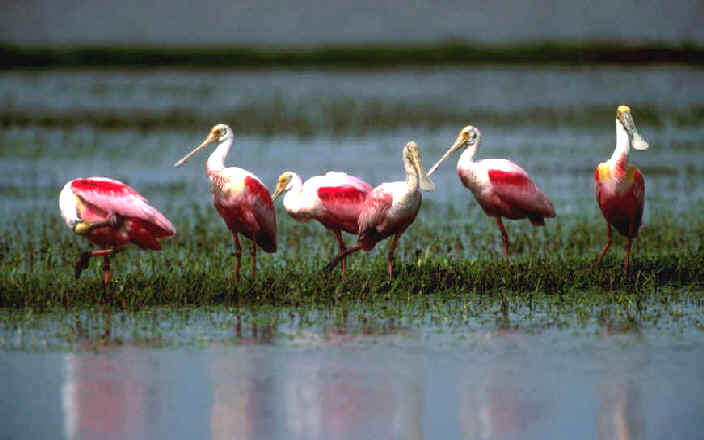
Roseate Spoonbills
BUTORIDES
- Striated Heron (ph) (*) ______ AF:oct AM:feb,aug br MN:may,sep,oct MS:mar,aug,sep,oct
MT:aug,oct RS:oct SE:aug,oct
Butorides s. striatus
At one time, the Striated Heron was considered
conspecific with the Green Heron of North America and most of Central
America, and was then called the Green-backed Heron.
Outside Brazil, the Striated Heron has been found during FONT
tours in Argentina, Bolivia, Ecuador, Venezuela.
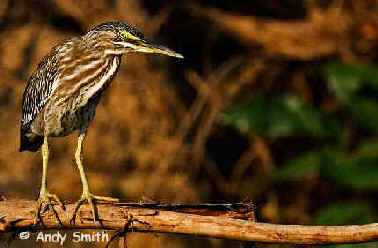
A Striated Heron photographed during a
FONT Brazil Tour
IXOBRYCHUS
- Least Bittern (ph) (*) ______
MT:oct
Ixobrychus exilis erythromelas
Outside Brazil, the Least Bittern has been found during
FONT tours in Argentina.
- Stripe-backed Bittern (*) ______ se
Ixobrychus involucris (monotypic)
Outside Brazil, the Stripe-backed Bittern has been found during FONT
tours in Argentina, Chile.
BOTAURUS
- Pinnated Bittern (ph) (*) ______
SE:oct
Botaurus p. pinnatus
Outside Brazil, the Pinnated Bittern has been found during FONT
tours in Argentina, Guatemala, Mexico.
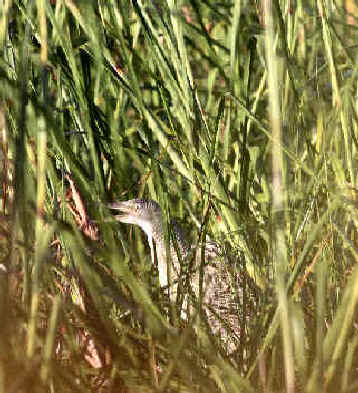
Pinnated Bittern,
photographed during a FONT tour
TIGRISOMA
- Rufescent Tiger Heron (ph) (*) ______ af AM:feb MN:may,sep MS:mar,aug,sep,oct
MT:aug,oct RS:oct SE:aug
Tigrisoma lineatum marmoratum
Outside Brazil, the Rufescent Tiger Heron has been found
during FONT tours in Argentina, Ecuador, Uruguay, Venezuela.
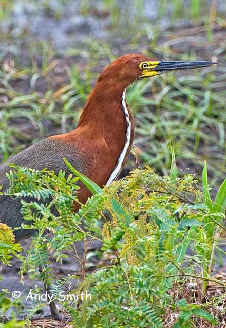
An adult Rufescent Tiger Heron
photographed
during a FONT Brazil Tour in the Pantanal
- Fasciated Tiger Heron
______
Tigrosoma fasciatum
Outside Brazil, the Fasciated Tiger Heron has been found during FONT tours
in Costa Rica.
ZEBRILUS
- Zigzag Heron (nt) (*) ______ AF:oct mt
Zebrilus undulatus (monotypic,
and the single member of its genus)
Outside Brazil, the Zigzag Heron has been found during
FONT tours in Ecuador, Venezuela.
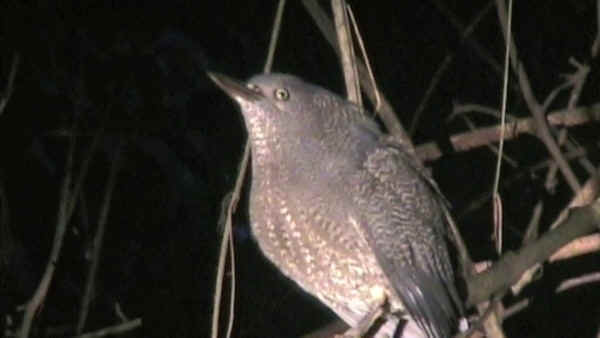
Zigzag Heron
(photo by Frank Stermitz)
NYCTANASSA
- Yellow-crowned Night Heron (ph) (*)
______ SE:mar,aug,oct
Nyctanassa violacea cayennensis (the single member of its
genus)
Outside Brazil, the Yellow-crowned Night Heron has been
found during FONT tours in Venezuela.
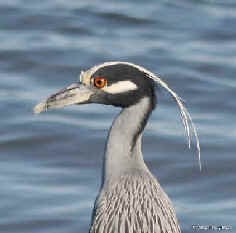
Yellow-crowned Night-Heron.
In Brazil, this species occurs in mangroves & similar habitats,
only along the seacoast.
(photo by Abram Fleishman)
NYCTICORAX
- Black-crowned Night Heron (*) ______ br
ig
MN:sep,oct MS:mar,aug,sep,oct MT:aug RS:oct
SE:mar,aug,oct
Nycticorax nycticorax hoactli
Outside Brazil, the Black-crowned Night Heron has been
found during FONT tours in Argentina, Chile, Uruguay, Venezuela.
COCHLEARIUS
- Boat-billed Heron (ph) (*) ______ AF:oct AM:aug MS:sep MT:aug
Cochlearius c. cochlearius (the single member of its genus)
Outside Brazil, the Boat-billed Heron has been found during
FONT tours in Ecuador, Venezuela.
AGAMIA
- Agami Heron (t3) (ph) (*) ______ af
AM:feb mt
(has also been called Chestnut-bellied Heron)
Agamia agami (monotypic, and the single member of its genus)
Outside Brazil, the Agami Heron has been found during FONT
tours in Belize, Costa Rica, Ecuador, Guatemala, Panama, Venezuela.
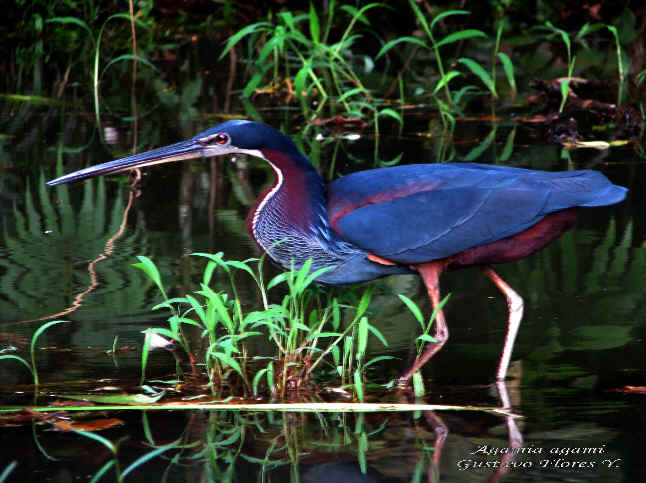
Agami Heron
PILHERODIUS
- Capped Heron (ph) (*) ______ af AM:feb,aug MN:may MS:aug,sep,oct
MT:mar,aug,oct SE:aug
Pilherodius pileatus (monotypic, and the single member of its genus)
Outside Brazil, the Capped Heron has been found during FONT
tours in Venezuela.
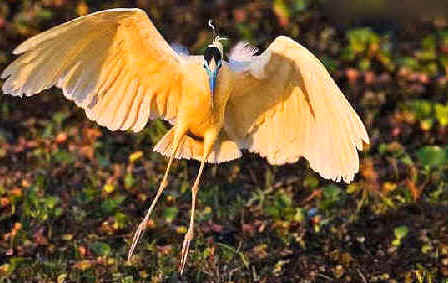
Capped Heron, photographed during a FONT
tour in Brazil
SYRIGMA
- Whistling Heron (ph) (*) ______ br MN:may,oct MS:mar,aug,sep,oct MT:aug
RS:jul,oct SE:mar,jul,aug,oct
Syrigma s. sibilatrix
(the single member of its genus)
Outside Brazil, the Whistling Heron has been found during
FONT tours in Argentina, Venezuela.
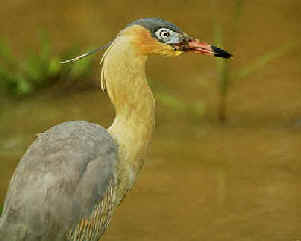
Whistling Heron
ARDEOLA
-
Squacco Heron ______ (r/BR)
Ardeola ralloides
The Squacco Heron has occurred in
Brazil as a vagrant, from Africa, on the Fernando de Noronha Islands
offshore from northeast Brazil, in June 1986.
Outside Brazil the Squacco Heron has been found during FONT tours
in Spain.
BUBULCUS
- Western Cattle Egret (ph) (*) ______
AF:oct AM:aug IG:aug
MN:mar,may,aug,sep,oct MS:mar,aug,sep,oct
MT:aug,oct RS:jul,oct SE:mar,may,jul,aug,oct
Bubulcus ibis (monotypic)
The Western Cattle Egret is in parts of Europe and Africa,
and now in much of the Americas. The Eastern Cattle Egret, Bubulcus
coromandus, is in eastern Asia.
Outside Brazil, the Western Cattle Egret has been found
during FONT tours in Argentina, Chile. Ecuador, Paraguay, Uruguay, Venezuela.
The Eastern Cattle Egret has been found during FONT tours in Japan.
EGRETTA
- Little Blue Heron (ph) (*) ______
MS:mar,aug MT:aug RS:oct
SE:mar,jul,aug,oct
Egretta caerulea (monotypic)
Outside Brazil, the Little Blue Heron has been found
during FONT tours in Chile (in the far-north), Ecuador, Venezuela.
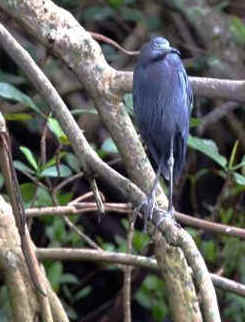
An adult Little Blue Heron in mangroves in
Southeast Brazil
(photographed during the March 2008
tour by Marie Gardner)
- Snowy Egret (ph) (*) ______ af AM:feb,aug IG:jul,sep
MN:may,aug,sep,oct MS:mar,aug,sep,oct
MT:mar,aug RS:jul,oct SE:mar.jul,aug,oct
Egretta thula brewsteri
Outside Brazil, the Snowy Egret has been found during
FONT tours in Argentina, Chile, Ecuador, Uruguay, Venezuela.
- Tricolored Heron (ph)
______ (in far-northern Brazil)
Egretta tricolor
Outside Brazil, the Tricolored Heron
has been found during FONT tours in Venezuela.
- Little Egret (ph)
______ (r/BR)
Egretta garzetta
The Little Egret has occurred in Brazil as a vagrant, from
Africa, in the area of the Fernando de Noronha Islands, offshore from
northeast Brazil.
Outside Brazil, the Little Egret has been found during FONT tours in
Japan, Spain.
ARDEA
- Cocoi Heron (ph) (*) ______
AF:oct
AM:feb,aug ig
MN:mar,sep,oct MS:mar,aug,sep,oct MT:aug,oct RS:jul,oct
SE:mar,jul,aug,oct (has also been called White-necked Heron, but there's a species so-named
in Australia)
Ardea cocoi (monotypic)
Outside Brazil, the Cocoi Heron has been found during FONT
tours in Argentina, Bolivia, Chile, Ecuador, Panama, Uruguay, Venezuela.
- Great Egret (ph) (*) ______ AF:oct AM:feb,aug br IG:jul,aug,sep
MN:mar,may,aug,sep,oct
MS:mar,aug,sep,oct MT:aug RS:jul,oct
SE:mar,may,jul,aug,oct
Casmerodius (has been Ardea)
alba egretta
Outside Brazil, the Great Egret has been found during FONT tours in
Argentina, Chile, Ecuador, Uruguay, Venezuela.
- Grey Heron (ph)
______ (r/BR)
Ardea cinerea
The Grey Heron, of the Old
World, has occurred as a vagrant in Brazil. It was in Para in December 1973.
The bird had been banded in France in may of that year.
Outside Brazil, the Grey Heron has been found during FONT tours in
Iceland, Japan.
- Purple Heron ______ (r/BR)
Ardea purpurea
The Purple Heron has occurred in Brazil as a vagrant, from Africa, on
the Fernando de Noronha Islands off northeast Brazil, in 1986.
Outside Brazil, the Purple Heron has been seen during FONT tours in
Japan, Spain.
PHAETHON
- Red-billed Tropicbird (ph)
______ (nests on Fernando de Noronha & other islands
offshore from Brazil, and occasionally occurs along the Brazilian
seacoast)
Phaethon aethereus
Outside Brazil, the Red-billed
Tropicbird has been found during FONT tours in Barbuda and Saint Lucia
in the Caribbean.
- Red-tailed Tropicbird ______
(r/BR)
Phaethon
rubricauda
Although the Red-tailed Tropicbird
is more a bird of the Pacific Ocean, it does, on occasion, occur in the
South Atlantic.
- White-tailed Tropicbird (ph)
______ (occurs at the Fernando de Noronha islands offshore from
northeast Brazil)
Phaethon lepturus
FREGATA
- Magnificent Frigatebird (ph) ______ RS:jul SE:mar,may,jul,aug,oct
Fregata magnificens (now considered monotypic)
- Great Frigatebird ______
(nests on the island of Trindade, offshore from northeast Brazil)
Fregata minor
- Lesser Frigatebird ______ (nests
on the islands of Trindade & Martim Vaz, offshore from northeast Brazil)
Fregata ariel
trinitatis (subspecies endemic to Trindade & Martim Vaz
islands)
PELECANUS
- Brown Pelican (ph) ______
(in northern Brazil)
Pelecanus
occidentalis
Outside Brazil, the Brown Pelican has
been found during FONT tours in Venezuela.
SULA
- Brown Booby (ph) (*) ______ SE:may,aug,oct
Sula l. leucogaster
Outside Brazil, the Brown Booby has been found during
FONT tours in Chile (in the far-north).
- Masked Booby ______
Sula dactylatra
- Red-footed Booby (ph) ______
Sula sula
MORUS
- Cape Gannet (t3) ______ (occurs
offshore from Brazil on the Continental Platform between the latitudes of 33
and 34 degrees south)
Morus capensis
- Australasian Gannet ______ (r/BR)
Morus serrator
The Australasian Gannet has
occurred as a vagrant in Brazil along the coast, in the southern part of the
country, in Rio Grande do Sul and Santa Catarina, on the islands Moleques do
Sul.
PHALACROCORAX
- Neotropic Cormorant (ph) ______ AF:oct AM:feb,aug br IG:jul,aug,sep
MN:may,aug,sep,oct MS:mar,aug,sep,oct
MT:mar,aug,oct RS:jul,oct SE:mar,jul,aug,oct (has also been called
Olivaceous Cormorant)
Phalacrocorax b. brasilianus (formerly P. olivacous)
Outside Brazil, the Neotropic Cormorant has been found
during FONT tours in Argentina, Bolivia, Chile, Ecuador, Paraguay, Uruguay, Venezuela.
- Antarctic Shag ______ (r/BR)
Phalacrocorax bransfieldensis
An single Antarctic Shag was found dead on the northern coast of
Bahia in 1996, A band on the specimen indicated that it came from the South
Shetland Islands in the far-southern Atlantic Ocean.
ANHINGA
- Anhinga (ph) (*) ______ af AM:feb,aug MN:aug MS:mar,aug,sep,oct
MT:mar,aug,oct
RS:oct
Anhinga a. anhinga
Outside Brazil, the Anhinga has been found during FONT
tours in Argentina, Ecuador, Venezuela.
SACORAMPHUS
- King Vulture (ph) (*) ______ af br ig MN:oct MT:aug,oct
Sarcoramphus papa (monotypic, and the single member of its genus)
Outside Brazil, the King Vulture has been found during FONT
tours in Argentina, Belize, Costa Rica, Ecuador, Mexico, Venezuela.
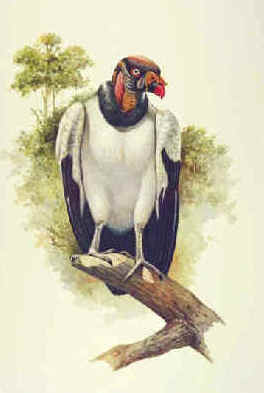
An adult King Vulture
CORAGYPS
- Black Vulture (ph) (*) ______ AF:oct AM:feb,aug br ES:oct
IG:jul,aug.sep MN:mar,may,aug,sep,oct
MS:mar,aug,sep,oct MT:mar,aug,oct RS:jul,oct
SE:mar,may,jul,aug,oct
Coragyps atratus (brasiliensis) (now said to be monotypic)
Outside Brazil, the Black Vulture has been found during FONT tours in
Argentina, Bolivia, Chile, Ecuador, Paraguay, Venezuela.
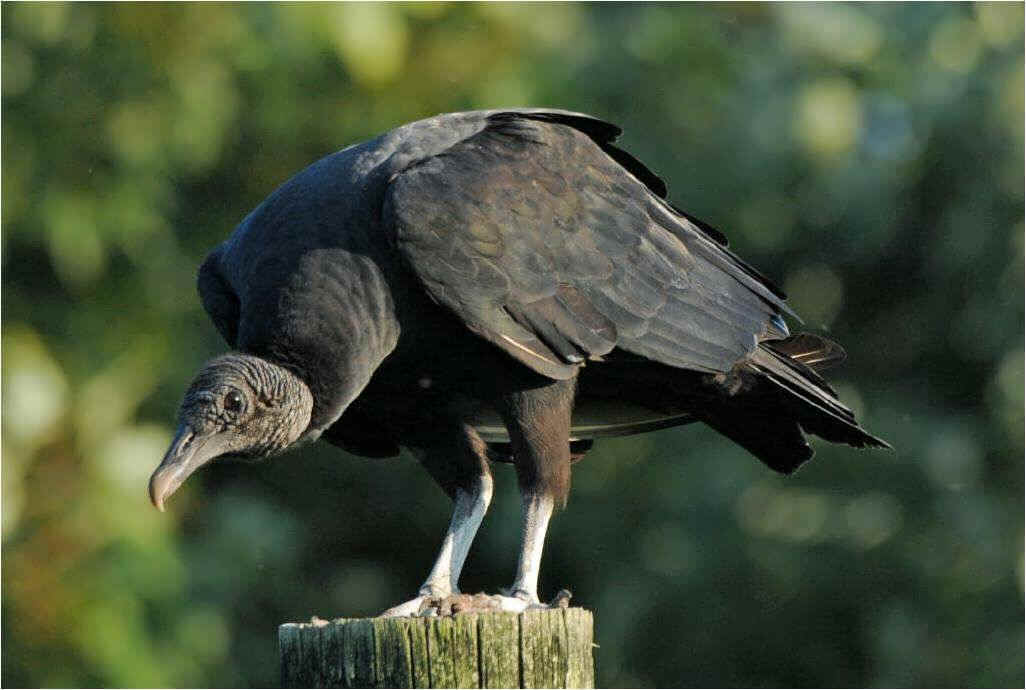
Black Vulture
(photo by Howard Eskin)
CATHARTES
- Turkey Vulture (ph) (*) ______
AF:oct AM:feb,aug br IG:jul,aug,sep
MN:mar,may,aug,sep,oct MS:mar,aug,sep,oct
MT:mar,aug,oct RS:jul,oct SE:mar,may,jul,aug,oct
Cathartes aura ruficollis
Outside Brazil, the Turkey Vulture has been found during FONT
tours in Argentina, Bolivia, Chile, Ecuador, Paraguay, Uruguay, Venezuela.
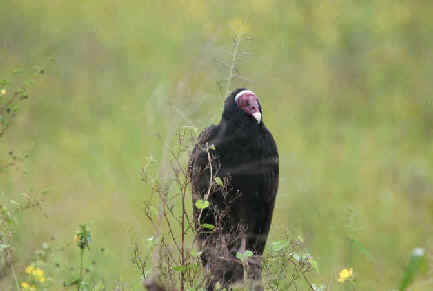
A Turkey Vulture, of the local race in Mato
Grosso do Sul,
with its distinctive white forehead and bill.
(Photographed during the FONT Brazil Tour in
March 2008)
- Lesser Yellow-headed
Vulture (ph) (*) ______
AM:feb,aug MN:may MS:mar,aug,sep,oct MT:aug RS:oct
Cathartes burrovianus urubitinga (now said to be monotypic)
Outside Brazil, the Lesser Yellow-headed Vulture has been found
during FONT tours in Argentina, Venezuela.
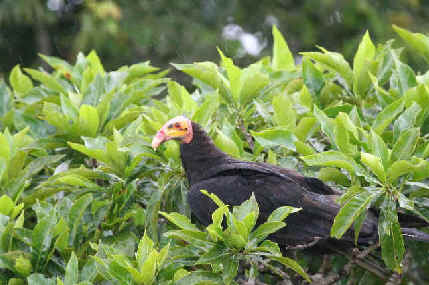
A Lesser Yellow-headed Vulture
(Photographed during the FONT Brazil tour in Mato
Grosso do Sul in March 2006.)
- Greater Yellow-headed
Vulture (*) ______ AF:oct AM:feb,aug
MT:mar,oct
Cathartes melambrotus (monotypic)
Outside Brazil, the Greater Yellow-headed Vulture has been
found during FONT tours in Ecuador, Venezuela.
- Andean Condor (nt) (ph) ______
(r/BR)
Vultur gryphus
The Andean Condor has occurred in western Brazil, at about 5,000 feet
above sea level, in the area of the Jauru River, in Mato Grosso, in company
with King Vultures and Black Vultures.
Outside Brazil, the Andean Condor has been found during FONT
tours in Argentina, Chile.
CARACARA
- Northern Crested Caracara (ph) (*) ______
AM:feb,aug (was considered conspecific with the now Southern Crested Caracara
that's
generally south of the Amazon)
Caracara cheriway (monotypic)
Outside Brazil, the Northern Crested Caracara has been found
during FONT tours in Venezuela.
- Southern Crested Caracara (ph)
(*) ______ af,br IG:aug,sep MN:mar.may,aug,sep,oct MS:mar,aug,sep,oct
MT:mar,aug,oct RS:jul,oct SE:mar,may,jul,aug,oct (was considered conspecific with Northern
Crested Caracara, Caracara cheriway, of north
of the Amazon & further north in Central America & parts of North
America)
Caracara plancus
Outside Brazil, the Southern Crested Caracara has been found during
FONT tours in Argentina, Bolivia, Chile, Paraguay, Uruguay.
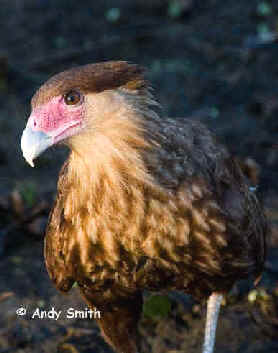
Above & below: Southern Crested Caracaras
photographed
during FONT tours in Brazil
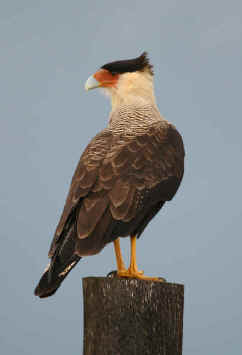
DAPTRIUS
- Black Caracara (*) ______ AF:oct AM:aug MT:aug
Daptrius ater (monotypic, and
the single member of its genus)
Outside Brazil, the Black Caracara has been found during FONT
tours in Ecuador.
IBYCTER
- Red-throated Caracara (*) ______ AF:oct AM:feb
Ibycter americanus (monotypic,
and the single member of its genus)
Outside Brazil, the Red-throated Caracara has been found during
FONT tours in Ecuador, Panama, Venezuela.
MILVAGO
- Yellow-headed Caracara (*) ______ af AM:feb,aug IG:jul,sep
MN:mar,may,aug,sep,oct MS:mar,aug,sep,oct
MT:mar RS:jul,oct SE:mar,may,jul,aug,oct
Milvago c. chimachima
Outside Brazil, the Yellow-headed Caracara has been found
during FONT tours in Argentina, Ecuador, Paraguay, Venezuela.
- Chimango Caracara (ph) (*) ______
RS:jul,oct SE:oct
Milvago c. chimago
Outside Brazil, the Chimango Caracara has been found
during FONT tours in Argentina, Chile, Uruguay.
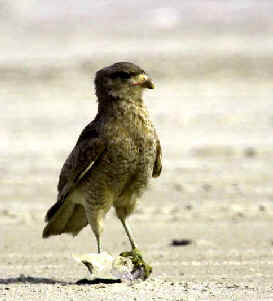
A Chimango Caracara photographed on a
beach
during a FONT Brazil Tour in Rio Grande do Sul
HERPETOTHERES
- Laughing Falcon (*) ______ af AM;feb IG:sep MN:aug,sep,oct MS:mar
MT:aug,oct SE:aug
Herpetotheres cachinnans queribundus (the single member of
its genus)
Outside Brazil, the Laughing Falcon has been found during FONT tours
in Ecuador, Venezuela.
MICRASTUR
- Barred Forest Falcon (*) ______ MN:oct MT:mar SE:may,aug
Micrastur r. ruficollis
- Collared Forest Falcon (*) ______ AM:feb MN:may,oct mt,se
Micrastur s. semitorquatus
- Cryptic Forest Falcon (*) ______
AF:oct
Micrastur mintoni
Micrastur mintoni
was said to be conspecific with the Lined Forest Falcon (below).
Micrastur mintoni
was recently described, in 2003.
- Lined Forest Falcon
______ (in northern Brazil)
Micrastur gilvicollis
Outside Brazil, the Lined Forest Falcon has been found during FONT tours in
Ecuador.
- Slaty-backed Forest Falcon
______
Micrastur mirandollei
- Buckley's Forest Falcon
______
Micrastur buckleyi
FALCO
- American Kestrel (ph) (*) ______ AF:oct br,ig MN:mar,may,aug,sep,oct MS:mar,aug,sep,oct
MT:mar,aug,oct RS:jul,oct SE:mar,aug,oct
Falco sparverius caerae
Outside Brazil, the American Kestrel has been found during FONT
tours in Argentina, Bolivia, Chile, Paraguay, Venezuela.
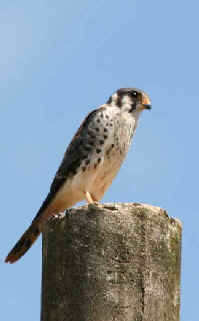
An American Kestrel photographed during a
FONT tour in Brazil
- Bat Falcon (ph) (*) ______ AF:oct AM:feb,aug IG:sep MN:may,oct MS:mar,aug
MT:oct SE:aug
Falco r. rufigularis
Outside Brazil, the Bat Falcon has been found during FONT
tours in Ecuador, Venezuela.
- Orange-breasted Falcon (nt) (ph) (*) ______
MT:oct
Falco deiroleucos (monotypic)
Outside Brazil, the Orange-breasted Falcon has been
found during FONT tours in Guatemala, Mexico.
- Aplomado Falcon (ph) (*) ______ br MN:mar,aug,sep,oct MS:mar,aug,sep
MT:mar,aug,oct RS:jul SE:aug
Falco f. femoralis
Outside Brazil, the Aplomado Falcon has been found
during FONT tours in Argentina, Bolivia, Chile, Venezuela
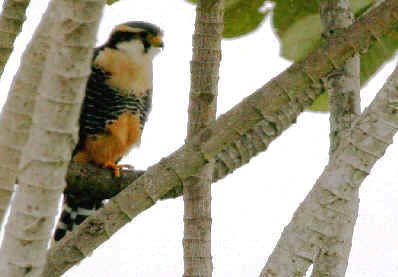
An Aplomado Falcon photographed during a
FONT tour in Brazil
- Peregrine Falcon (ph) (*) ______ ig AM:feb se
Falco peregrinus tundrius
Outside Brazil, the Peregrine Falcon has been found during FONT
tours during Argentina, Chile, Ecuador, Venezuela.
- Merlin (ph)
______ (in far-northern Brazil)
Falco columbarius
Outside Brazil, the Merlin has been found during FONT tours in Venezuela.
PANDION
- Osprey (ph) (*) ______ AM:feb,aug br MN:mar MS:mar,oct
MT:mar,aug SE:aug,oct
Pandion haliaetus carolinensis
(the single member of its
genus)
Outside Brazil, the Osprey has been found during FONT tours in
Bolivia, Ecuador,
Japan, Venezuela.
ELANOIDES
- Swallow-tailed Kite (ph) (*) ______ AF:oct AM:feb ES:oct MN:oct
MT:mar,oct RS:oct SE:oct
Elanoides forficatus yetapa
(the single member of its genus)
Outside Brazil, the Swallow-tailed Kite has been found during FONT tours in
Argentina, Ecuador, Venezuela.
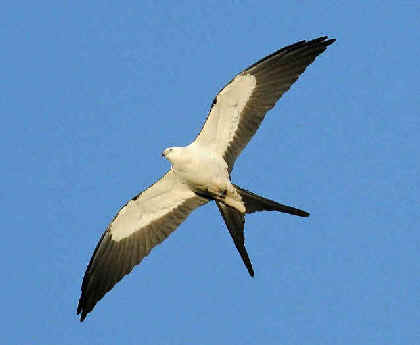
Swallow-tailed Kite
(photo by Howard Eskin)
GAMPSONYX
- Pearl Kite (ph) (*) ______ MT:mar
Gampsonyx s. swainsonii (the single member of its genus)
Outside Brazil, the Pearl Kite has been found during FONT tours in
Costa Rica and Ecuador.
ELANUS
- White-tailed Kite (ph) (*) ______ af,br MN:mar,sep,oct MS:sep mt
RS:jul,oct SE:mar,jul,aug,oct
Elanus l. leucurus
Outside Brazil, the White-tailed Kite has been found during
FONT tours in Argentina, Chile, Paraguay, Uruguay, Venezuela.
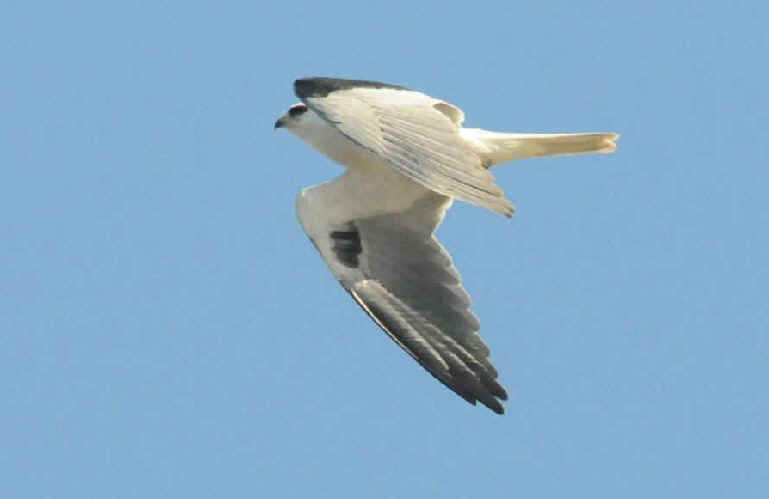
White-tailed Kite
(photo by Howard Eskin)
LEPTODON
- Gray-headed Kite (*) ______
AM:feb MS:aug MT:aug,oct
Leptodon cayanensis monachus (the single member of its genus)
Outside Brazil, the Gray-headed Kite has been found during FONT
tours in Argentina, Venezuela.
- White-collared Kite
(t1) ______ (in northeast Brazil)
Leptodon forbesi
CHONDROHIERAX
- Hook-billed Kite (*) ______
IG:jul
MT:oct
Chondrohierax u. uncinatus
(the single member of its genus)
Outside Brazil, the Hook-billed Kite has been found during FONT tours in
Argentina, Ecuador.
ROSTRHAMUS
- Snail Kite (ph) (*) ______ AF:oct AM:aug IG:aug,sep MS:mar,aug,sep,oct
MT:aug
RS:jul,oct SE:oct
Rostrhamus s. sociabilis
Outside Brazil, the Snail Kite has been found during FONT tours in
Argentina, Belize, Bolivia, Uruguay, Venezuela.
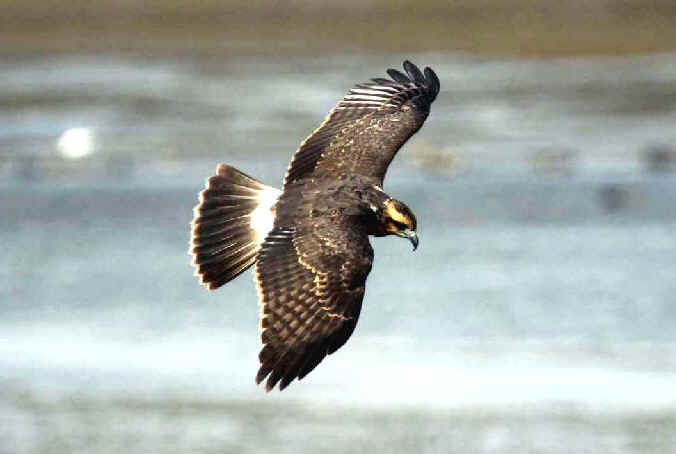
A Snail Kite photographed during a
FONT tour
(photo by Marie Gardner)
-
Slender-billed Kite ______ (occurs mostly in Amazonian Brazil)
Rostrhamus hamatus
Outside Brazil, the Slender-billed Kite has been found during FONT tours
in Ecuador.
HARPAGUS
- Double-toothed Kite (*) ______ AF:oct AM:feb
Harpagus b. bidentatus
Outside Brazil, the Double-toothed Kite has been found during FONT tours
in Venezuela.
- Rufous-thighed Kite (*) ______ IG:aug MN:oct MS:sep mt
SE:aug.oct
Harpagus diodon
(monotypic)
Outside Brazil, the Rufous-thighed Kite has been found during
FONT tours in Argentina.
ICTINIA
- Plumbeous Kite (*) _______ AF:oct AM:feb ig MN:mar,sep,oct MS:sep,oct
MT:aug,oct
Ictinia plumbea (monotypic)
Outside Brazil, the Plumbeous Kite has been found during FONT tours in
Argentina, Ecuador, Venezuela.
-
Mississippi Kite ______
Ictinia mississippiensis
CIRCUS
- Long-winged Harrier (ph) (*) ______ MS:mar,aug mt RS:jul,oct
Circus buffoni (monotypic)
Outside Brazil, the Long-winged Harrier has been found during
FONT tours in Argentina, Uruguay.
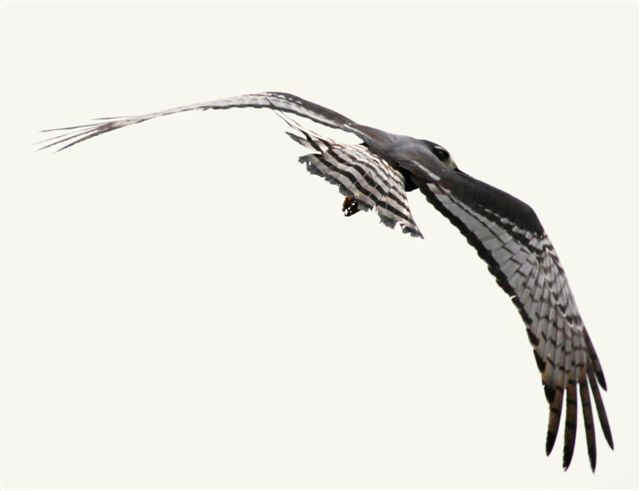
Long-winged Harriers, photographed during
the FONT Brazil Tour in Rio Grande do Sul in October 2009.
The upper photo shows the bird to be aptly named.
(photos by Marie Gardner)
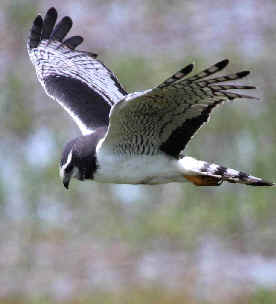
- Cinereous Harrier (*) ______
RS:oct
Circus cinereus (monotypic)
Outside Brazil, the Cinereous Harrier has been found during FONT
tours in Argentina, Chile, Uruguay.
GERANOSPIZA
- Crane Hawk (ph) (*) ______ AM:feb,aug MN:oct MS:mar,aug,sep
MT:aug
Geranospiza caerulescens flexipes (the single member of its
genus)
Outside Brazil, the Crane Hawk has been found during FONT tours in Ecuador,
Venezuela.
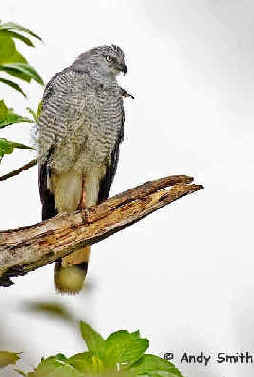
A Crane Hawk photographed during a FONT
Brazil Tour in the Pantanal
ACCIPITER
- Rufous-thighed Hawk (*) ______ MN:oct mt RS:oct se
Accipiter erythronemius
The Rufous-thighed Hawk has been considered conspecific
with the more-northerly Sharp-shinned Hawk, Accipiter
striatus.
Outside Brazil, the Rufous-thighed Hawk has been during a
FONT tour in Uruguay.
- Bicolored Hawk (*) ______ MN:sep,oct SE:aug,oct
Accipiter bicolor pileatus
Outside Brazil, the Bicolored Hawk has been found
during FONT tours in Argentina.
What has been the Bicolored Hawk in Chile is now said to be the Chilean Hawk,
Accipiter chilensis.
- Tiny Hawk (*) ______ af mt
Accipiter s. superciliosus
- Gray-bellied Hawk (nt) (*) ______ MN:oct
se
Accipiter poliogaster (monotypic)
LEUCOPTERNIS (and PSEUDASTUR)
- White-browed Hawk (*) ______ AF:oct mt
Leucopternis kuhli (monotypic)
- White Hawk (ph) (*) ______
AF:oct
AM:feb MT:aug
Pseudastur a. albicollis (formerly Leucopternis a. albicollis)
Outside Brazil, the White Hawk has been found during FONT tours in Belize,
Costa Rica, Ecuador, Venezuela.
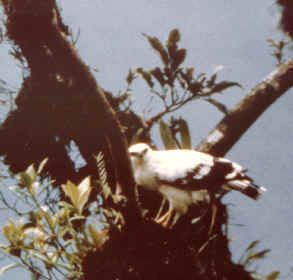
White Hawk
(photo by Alan Brady)
- Mantled Hawk (nt) (BRqe) (*) ______ MN:sep SE:aug,oct
Pseudastur polionotus
(was Leucopternis polionotus) (monotypic)
- Black-faced Hawk (*) ______
AM:feb
Leucopternis melanops
Outside Brazil, the Black-faced Hawk has been found during FONT tours in
Ecuador.
BUTEOGALLUS
- Slate-colored Hawk (*)
______ af AM:feb,aug
Buteogallus schistacea
(monotypic)
Outside Brazil, the Slate-colored Hawk has been found during FONT
tours in Ecuador.
- Great Black Hawk (ph) (*) ______ af AM:feb ig MN:sep,oct MS:mar,aug,sep,oct
MT:aug RS:oct SE:aug
Buteogallus u. urubitinga
Outside Brazil, the Great Black Hawk has been found during FONT tours in
Argentina, Venezuela.
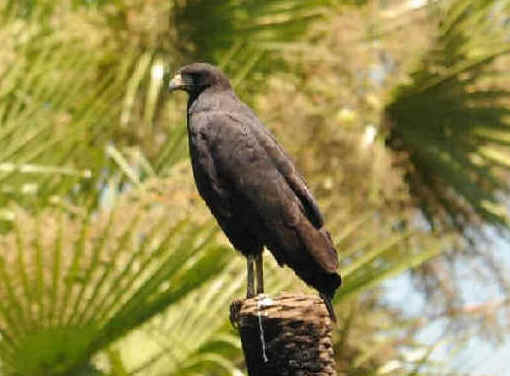
A Great Black Hawk photographed
during a FONT tour
in Mato Grosso do Sul in October 2010
(photo by Bob Enever)
- Savanna Hawk (ph) (*) ______ AM:feb br,ig MN:may,aug,sep,oct MS:mar,aug,sep,oct
MT:mar,aug,oct RS:jul,oct SE:mar,may,aug,oct
Buteogallus meridionalis (monotypic)
Outside Brazil, the Savanna Hawk has been found during FONT tours in
Argentina, Venezuela.
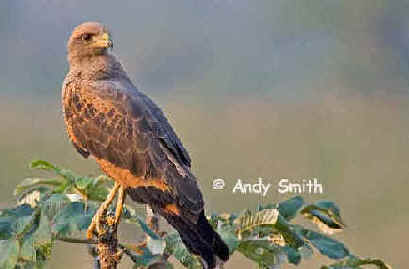
Savanna Hawk, photographed during a FONT tour in
Brazil
- Rufous Crab Hawk ______
Buteogallus aequinoctialis
- White-necked Hawk (t3) (*)
______ SE:aug
Buteogallus lacernulata
HARPYHALIAETUS
- Crowned Solitary Eagle (t3) (ph) (*) ______
MN:mar,sep mt
Harpyhaliaetus coronatus (monotypic)
Regarding the
CROWNED SOLITARY EAGLE, go to:
RARE BIRDS of BRAZIL
Outside Brazil, the Crowned Solitary Eagle has been found during
FONT tours in Argentina.
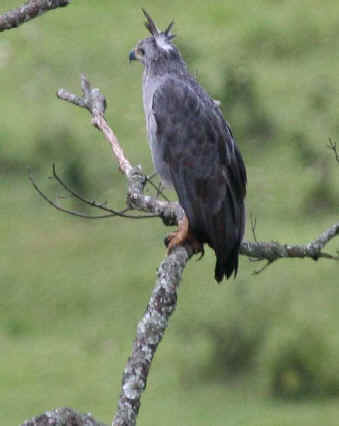
A Crowned Solitary Eagle,
photographed during a FONT Brazil Tour
in Minas Gerais in March 2008
BUSARELLUS
- Black-collared Hawk (ph) (*) ______ af AM:feb,aug MS:mar,aug,sep,oct
MT:aug.oct
Busarellus nigricollis leucocephalus
(the single member of
its genus)
Outside Brazil, the Black-collared Hawk has been found during FONT tours in
Argentina, Belize, Venezuela.
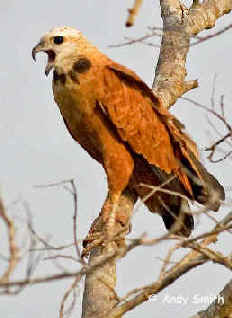
Black-collared Hawk, photographed during a
FONT tour in Brazil
GERANOAETUS
- Black-chested Buzzard-Eagle
(ph) (*) ______ MN:sep,oct MS:aug
RS:oct
Geranoaetus m. melanoleucus
Outside Brazil, the Black-chested Buzzard-Eagle has been found
during FONT tours in Argentina, Chile, Venezuela.
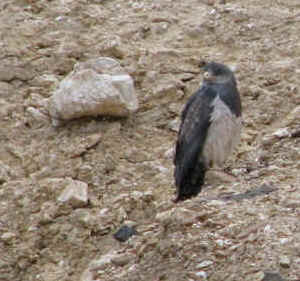
An adult Black-chested Buzzard-Eagle photographed
during a FONT tour
(photo by Frank Stermitz)
- White-tailed Hawk (*) ______ MN:mar,may,aug,sep,oct MS:mar,aug,sep,oct MT:oct
RS:jul,oct SE:jul,aug,oct
Geranoaetus a. albicaudatus (formerly
Buteo a. albicaudatus)
Outside Brazil, the White-tailed Hawk has been found during
FONT tours in Argentina, Venezuela.
BUTEO
- Gray-lined Hawk (ph) (*) ______ af AM:feb,aug MT:aug SE:aug (includes "Gray Hawk" of mostly
Central America)
Buteo nitidus pallida
Outside Brazil, the Gray-lined Hawk has been found during FONT tours in
Argentina, Venezuela.
- Roadside Hawk (ph) (*) ______ AM:feb,aug br ES:oct IG:jul,sep
MN:may,mar,aug,sep,oct
MS:mar,aug,sep MT:mar,aug RS:jul,oct
SE:mar,may,jul,aug,oct
Rupornis magnirostris magniplumis
(formerly Buteo magnirostris magniplumis)
Outside Brazil, the Roadside Hawk has been found during FONT tours in
Argentina, Bolivia, Ecuador, Paraguay, Venezuela.
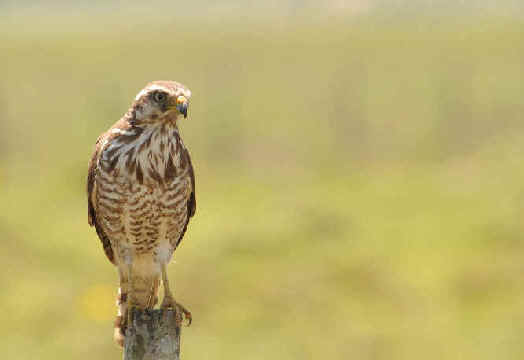
An immature Roadside Hawk photographed
during a FONT tour
in Rio Grande do Sul (photo by Marie Gardner)
- Short-tailed Hawk (ph) (*) ______
MN:oct MS:oct mt SE:mar,aug,oct
Buteo b. brachyurus
Outside Brazil, the Short-tailed Hawk has been found during
FONT tours in Argentina, Venezuela.
- Zone-tailed Hawk (ph) (*) ______
SE:may,aug,oct
Buteo albonotatus (monotypic)
Outside Brazil, the Zone-tailed Hawk has been found during FONT
tours in Venezuela.
- Swainson's Hawk (ph) ______
Buteo swainsoni
Outside Brazil, the Swainson's Hawk has been found during FONT tours in
Argentina.
- Broad-winged Hawk (*) ______
AM:feb
Buteo platypterus
PARABUTEO
- Bay-winged Hawk
(ph) (*) ______ MS:aug,sep mt SE:oct (called Harris' Hawk in North America)
Parabuteo u. unicinctus
(the single member of its genus)
Outside Brazil, the Bay-winged Hawk has been found during FONT
tours in Argentina, Chile.
PERCNOHIERAX
- White-rumped Hawk ______
Percnohierax leucorrhous
HARPIA
- Harpy Eagle (nt) (ph) (*) ______ af
AM:feb MT:mar,aug,oct
Harpia harpyja (monotypic, and the single member of its genus)
Outside Brazil, the Harpy Eagle has been found during FONT tours in Ecuador.
Regarding the HARPY EAGLE, go to: RARE
BIRDS of BRAZIL
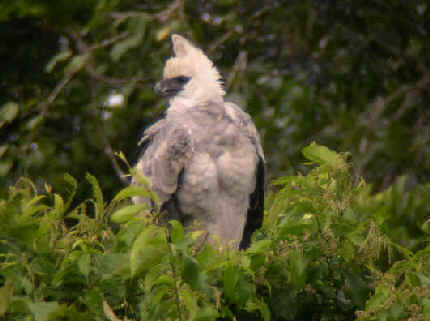
An immature Harpy Eagle
MORPHNUS
- Crested Eagle (nt) ______
Morphnus guianensis
Outside Brazil, the Crested Eagle has been found during a FONT tour in
Guatemala.
SPIZAETUS
- Ornate Hawk-Eagle (nt) (ph) (*) ______
af MN:sep MS:aug mt se
Spizaetus o. ornatus
Outside Brazil, the Ornate Hawk-Eagle has been found during FONT tours in
Guatemala, Ecuador.
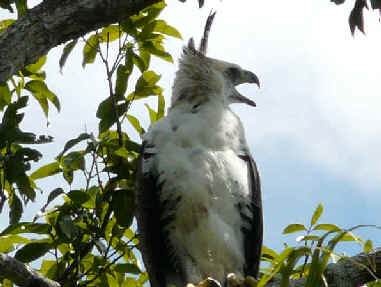
An immature Ornate Hawk-Eagle
- Black Hawk-Eagle (*) ______ af ES:oct MT:oct SE:may,jul,aug
Spizaetus t. tyrannus
Outside Brazil, the Black Hawk-Eagle has been found during FONT tours in
Guatemala, Ecuador, Venezuela.
SPIZASTUR
- Black-and-white
Hawk-Eagle (*) ______ mt,se
Spizaetus melanoleucus (was
Spizastur melanoleucus) (monotypic)
Outside Brazil, the Black-and-white Hawk-Eagle has been
found during FONT tours in Costa Rica, Guatemala, Panama.
CARIAMA
- Red-legged Seriema (ph) (*) ______
MN:mar,may,aug,sep,oct MS:mar,aug,sep MT:mar,aug RS:jul,oct
SE:aug,oct
Cariama cristata (monotypic, and the single member of its genus)
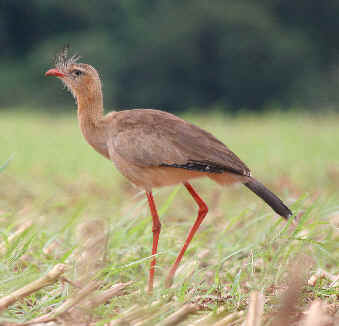
Above: Red-legged Seriema,
photographed during a FONT Brazil Tour in Minas Gerais
Below: Portrait of a Seriema
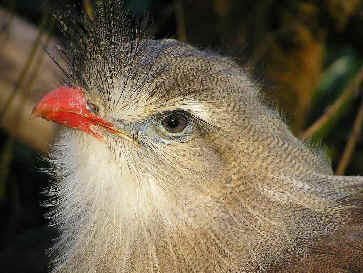
EURYPYGA
- Sunbittern (ph) (*) ______ af AM:feb MT:aug,oct
Eurypyga h. helias (the single member of its genus & family)
Outside Brazil, the Sunbittern has been found during FONT tours in
Costa Rica, Venezuela.
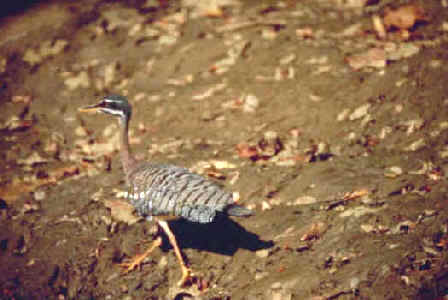
A Sunbittern photographed in Brazil
RALLUS
- Mangrove Rail ______
Rallus longirostris
Until 2014, the Mangrove Rail was part of the now
more-northerly Clapper Rail, now Rallus
crepitans.
PARDIRALLUS
- Plumbeous Rail (*) ______ RS:oct
Pardirallus sanguinolentus
Outside Brazil, the Plumbeous Rail has been found during FONT tours in
Argentina, Chile, Uruguay.
- Blackish Rail (*) ______ MN:may,sep,oct SE:aug.oct
Pardirallus n. nigricans
- Spotted Rail ______
Pardirallus maculatus
ARAMIDES
- Giant Wood Rail (*) ______
RS:oct
Aramides ypecaha (monotypic)
Outside Brazil, the Giant Wood Rail has been found during FONT
tours in Argentina, Uruguay.
- Gray-necked Wood Rail (ph) (*) ______ af AM:feb ig MN:mar,may,sep,oct MS:mar,aug,sep,oct
MT:mar,aug SE:mar,jul,aug,oct
Aramides c. cajaneus
Outside Brazil, the Gray-necked Wood Rail has been found during FONT tours
in Argentina, Bolivia, Ecuador, Paraguay.
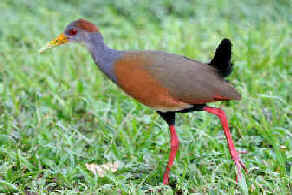
Gray-necked Wood Rail photographed during
a FONT tour
(photo
by Marie Gardner)
- Red-winged Wood Rail (*) ______
AM:aug
Aramides calopterus (monotypic)
- Slaty-breasted Wood Rail (BRqe) (*) ______ ig
MN:sep,oct SE:may,jul,aug,oct
Aramides saracura (monotypic)
Outside Brazil, the Slaty-breasted Wood Rail has been found
during FONT tours in Argentina.
- Little Wood Rail ______
Aramides mangle|
NEOCREX
- Paint-billed Crake ______
Neocrex erythrops
PORZANA
- Ash-throated Crake (*) ______ mn se
Porzana a. albicollis
Outside Brazil, the Ash-throated Crake has been found during
FONT tours in Argentina.
- Yellow-breasted Crake ______
Porzana flaviventer
Outside Brazil, the Yellow-breasted
Crake has been found during FONT tours in Argentina, Jamaica,
Venezuela.
- Dot-winged Crake ______ (in
far-southern Brazil)
Porzana spiloptera
- Sora ______ (in far-northern
Brazil)
Porzana carolina
MICROPYGIA
- Ocellated Crake ______
Micropygia schomburgkii
LATERALLUS
- Rufous-sided Crake (*) ______ af AM:feb MN:may MS:mar,sep RS:oct
SE:aug,oct
Laterallus m. melanophaius
Outside Brazil, the Rufous-sided Crake has been found during
FONT tours in Argentina, Uruguay.
- Rufous-faced Crake (t3) ______
Laterallus xenopterus
- Red-and-white Crake ______
Laterallus leucopyrrhus
- Gray-breasted Crake ______
Laterallus exilis
- Black-banded Crake ______ (in
western Amazonian Brazil)
Laterallus
fasciatus
- Russet-crowned Crake ______
Laterallus viridis
- Black Rail (nt) ______
Laterallus jamaicensis
AMAUROLIMNAS
- Uniform Crake ______
Amaurolimnas concolor
COTURNICOPS
- Speckled Crake (*) ______
RS:jul
(also called Speckled Rail)
Coturnicops notatus (monotypic)
GALLINULA
- Common Gallinule (ph) (*) ______ af MN:may,sep,oct
MS:aug,sep RS:jul,oct SE:mar,may,jul,aug,oct
Gallinula chloropus galeata
Outside Brazil, the Common Gallinule has been found during
FONT tours in Argentina, Chile, Japan, Uruguay, Venezuela.
- Spot-flanked Gallinule (*) ______
RS:jul,oct
Gallinula m. melanops
Outside Brazil, the Spot-flanked Gallinule has been found
during FONT tours in Argentina, Chile, Uruguay.
- Lesser Moorhen ______ (r/BR)
Gallinula angulata
The Lesser Moorhen, an African
bird, has occurred as a vagrant, once, in the area of the Fernando de
Noronha Islands offshore from northeastern Brazil.
PORHYRULA
- Purple
Gallinule (ph) (*) ______ AF:oct
AM:aug mn
MS:mar mt RS:oct SE:aug
Porphyrio (formerly Porphyrula) martinicus
(monotypic)
Outside Brazil, the Purple Gallinule has been found during FONT tours in
Argentina, Costa Rica, Ecuador, Panama, Venezuela.
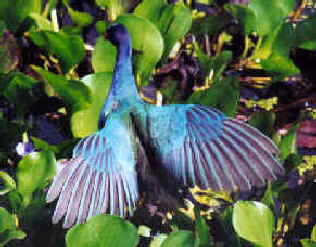
Purple Galinule
- Azure Gallinule (*) ______ mt
Porphyrula flavirostris (monotypic)
Outside Brazil, the Azure Gallinule has been found during FONT tours in
Argentina, Ecuador, Venezuela.
FULICA
- Red-gartered Coot (*) ______ RS:jul,oct
SE:aug,oct
Fulica armilata (monotypic)
Outside Brazil, the Red-gartered Coot has been found during
FONT tours in Argentina, Chile, Uruguay.
- White-winged Coot (*) ______
RS:oct
Fulica leucoptera (monotypic)
Outside Brazil, the White-winged Coot has been found during FONT tours
in Argentina, Chile.
- Red-fronted Coot (*) ______
RS:oct
Fulica rufifrons (monotypic)
Outside Brazil, the Red-fronted Coot has been found during FONT
tours in Argentina, Chile.
HELIORNIS
- Sungrebe (ph) (*) ______ af AM:aug MS:aug,oct mt
(has been called
"American
Finfoot")
Heliornis fulica (monotypic)
Outside Brazil, the Sungrebe has been found during FONT tours in
Venezuela.
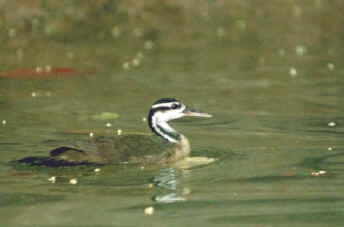
A Sungrebe photographed during a FONT
tour
PSOPHIA
- Gray-winged Trumpeter (*) ______ AM:feb,aug
Psophia c. crepitans
Outside Brazil, the Gray-winged Trumpeter has been found during FONT tours
in Ecuador.
- Dark-winged Trumpeter (t2) (BRe) (*) ______ af
Psophia v. viridis
- Pale-winged Trumpeter
______ (in western Amazonian Brazil)
Psophia leucoptera
ARAMUS
- Limpkin (ph) (*) ______ AF:oct AM:feb,aug ig MN:sep,oct MS:mar,aug,sep,oct
MT:aug RS:jul,oct se
Aramus g. guarauna (the single member of its genus &
family)
Outside Brazil, the Limpkin has been found during FONT tours in Argentina, Belize,
Ecuador, Uruguay, Venezuela.
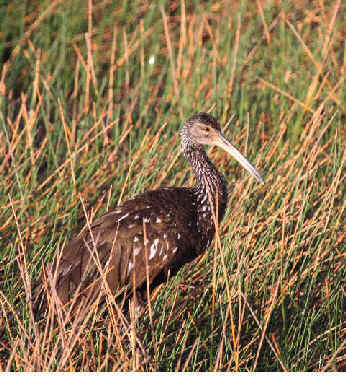
A Limpkin photographed during a FONT
tour
BURHINUS
- Double-striped
Thick-knee (ph) ______ (in far-northern Brazil)
Burhinus bistriatus
Outside Brazil, the Double-striped Thick-knee has been found during FONT
tours in Costa Rica, Venezuela.
CHIONIS
- Snowy Sheathbill
______ (in far-southern Brazil)
Chionis albus
Outside Brazil, the Snowy Sheathbill has been found during FONT tours in
Argentina, Chile.
HAEMATOPUS
- American Oystercatcher (ph) (*) ______
RS:jul,oct SE:aug
Haematopus p. palliatus
Outside Brazil, the American Oystercatcher has been
found during FONT tours in Argentina, Chile.
HIMANTOPUS
- White-backed
Stilt (*) ______ MS:mar,aug,sep mt RS:jul,oct
SE:jul,aug,sep (was said to be conspecific with the
Black-winged Stilt of the Old World, Himantopus
himantopus, including also
the Black-necked Stilt of North America)
Himantopus melanurus
Outside Brazil, the White-backed Stilt has been found
during FONT tours in Argentina, Chile, Uruguay.
- Black-necked Stilt
(ph) ______ (in far-northern Brazil)
Himantopus mexicanus
Outside Brazil, the Black-necked Stilt has been found during FONT
tours in Argentina (northwest), Chile (far-north), Venezuela.
VANELLUS
- Southern Lapwing (ph) (*) ______ AF:oct AM:feb,aug br IG:aug.sep
MN:mar,may,aug,sep,oct
MS:mar,aug,sep,oct MT:mar,aug,oct RS:jul,oct
SE:mar,may,jul,aug,oct
Vanellus chilensis lampronotus
Outside Brazil, the Southern Lapwing has been found during FONT tours in
Argentina, Belize (where rare), Chile, Costa Rica (where spreading), Ecuador,
Panama, Paraguay, Uruguay, Venezuela.
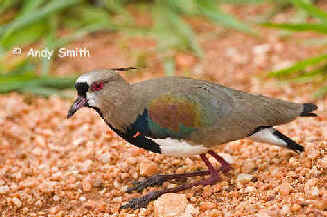
A Southern Lapwing
(above) photographed
during
a
FONT
Brazil Tour in Mato Grosso do Sul, with its eggs
(below)
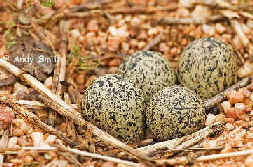
HOPLOXYPTERUS
- Pied Plover (*) ______ af (has been called Pied
Lapwing)
Hoploxypterus cayanus
(monotypic, and the single member of its genus)
Outside Brazil, the Pied Plover has been found during FONT tours in Ecuador,
Venezuela.
PLUVIALIS
- Grey Plover (ph) (*) ______ RS:oct
SE:aug (has been called Black-bellied Plover in the Americas)
Pluvialis squatarola cynosurae
Outside Brazil, the Grey (or Black-bellied) Plover
has been found during FONT tours in Argentina, Chile.
- American Golden Plover (ph) (*) ______
MS:aug,sep RS:oct
Pluvialis dominica (monotypic)
Outside Brazil, the American Golden Plover has been found during FONT
tours in Argentina, Chile.
CHARADRIUS
- Collared Plover (*) ______
AM:aug
MN:mar MS:mar,aug RS:jul,oct SE:aug
Charadrius collaris (monotypic)
Outside Brazil, the Collared Plover has been found during FONT tours in
Argentina, Chile, Ecuador, Uruguay, Venezuela.
- Semipalmated Plover (ph) (*) ______
MN:oct RS:oct SE:aug,oct
Charadrius semipalmatus
(monotypic)
Outside Brazil, the Semipalmated Plover has been found during
FONT tours in Argentina, Chile, Venezuela.
- Two-banded Plover
(ph) ______ (in far-southern Brazil)
Charadrius
falklandicus
Outside Brazil, the Two-banded Plover has been
found during FONT tours in Argentina, Chile.
- Wilson's Plover (ph)
______
Charadrius wilsonia
Outside Brazil, the Wilson's Plover
has been found during FONT tours in Mexico, Puerto Rico, and in the US in
North Carolina.
- Rufous-chested Plover
______ (has been called Rufous-chested Dotterel) (in far-southern
Brazil)
Charadrius modestus
Outside Brazil, the Rufous-chested Plover
has been found during FONT tours in Argentina, Chile.
OREOPHOLUS
- Tawny-throated Dotterel
______ (in far-southern Brazil)
Oreopholus ruficollis
Outside Brazil, the Tawny-throated Dotterel has been found during FONT tours
in Argentina, Chile.
NYCTICRYPHES
- South American Painted
Snipe ______ (in far-southern Brazil)
Nyctiryphes semicollaris
Outside Brazil, the South American Painted Snipe has been found during FONT
tours in Argentina, Chile.
JACANA
- Wattled Jacana (ph) (*) ______
AF:oct
AM:feb,aug ig MN:mar,may,aug,sep,oct MS:mar,aug,sep,oct MT:mar,aug RS:jul,oct
SE:may,jul,aug,oct
Jacana j. jacana
Outside Brazil, the Wattled Jacana has been found during FONT tours in
Argentina, Bolivia, Ecuador, Panama, Venezuela.
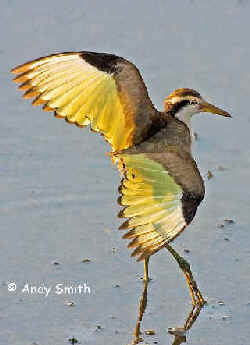
Above: a juvenile Wattled Jacana photographed
during a FONT tour in Brazil
Below: 2 adult Wattled Jacanas in the Pantanal in Brazil
(upper photo by Andy Smith; lower photo by Marie Grenouillet)
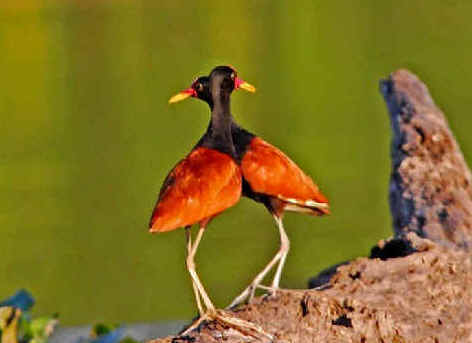
THINOCORUS
- Least Seedsnipe
______ (r/BR)
Thinocorus rumicivorus
The Least Seedsnipe, from
further south in South America, has occurred a a vagrant in far-southern
Brazil in Rio Grande do Sul.
Outside Brazil, the Least Seedsnipe has been found during FONT tours
in Argentina, Chile.
GALLINAGO
- South American Snipe (ph) (*) ______ ES:oct
MS:aug MT:jul,oct RS:jul,oct (was considered conspecific with what's now the Wilson's Snipe,
Gallinago delicata, of North America, which was formerly conspecific with the Common
Snipe, Gallinago gallinago, of the Old World)
Gallinago p. paraguaiae
Outside Brazil, the South American Snipe has been found during
FONT tours in Argentina, Chile, Venezuela.
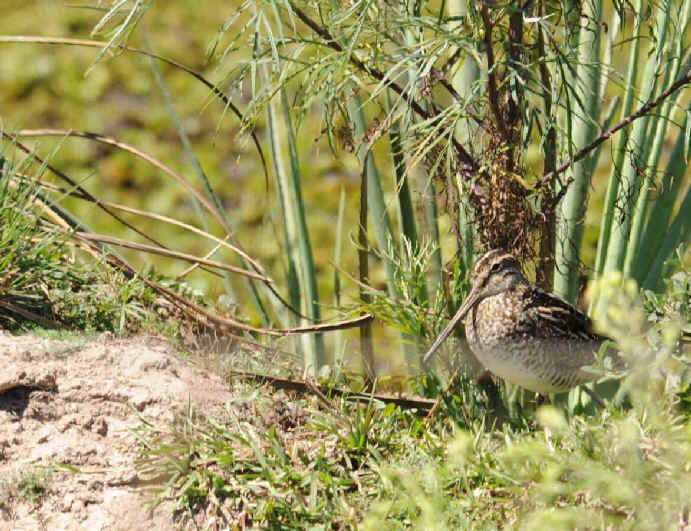
A South American Snipe photographed during
the FONT tour
in Rio Grande do Sul in October 2010
(photo by Bob Enever)
- Giant Snipe (*) ______ br
Gallinago undulata
LIMOSA
- Hudsonian Godwit (*) ______
(r/BR) RS:oct
Limosa haemastica (monotypic)
Outside Brazil, the Hudsonian Godwit has been found during FONT tours in
Argentina, Chile.
- Bar-tailed Godwit
(ph) ______ (r/BR)
Limosa lapponica
The Bar-tailed Godwit is
primarily a Eurasian bird. It has occurred in Brazil as a vagrant on the
Fernando de Noronha Islands, offshore from northeast Brazil.
NUMENIUS
- Whimbrel (ph) (*) ______ RS:oct
Numenius phaeopus
Outside Brazil, the Whimbrel has been found during FONT tours in
Argentina, Chile, Venezuela.
- Eskimo Curlew (t1) ______ (now presumed extinct; the last sightings may have been in the 1980s)
Numenius borealis
BARTRAMIA
- Upland Sandpiper (*) ______ ig MN:oct MS:aug RS:oct
Bartramia longicauda (monotypic, and the single member of its genus)
Outside Brazil, the Upland Sandpiper has been found during FONT tours in
Argentina.
LIMNODROMUS
- Short-billed Dowitcher
(ph) ______
Limnodromus griseus
Outside Brazil, the Short-billed Dowitcher has been found during FONT
tours in Argentina, Venezuela.
TRINGA
- Greater Yellowlegs (*) ______ af
MN:oct MS:aug,sep mt RS:jul,oct SE:aug
Tringa melanoleuca (monotypic)
Outside Brazil, the Greater Yellowlegs has been found during FONT tours in
Argentina, Chile, Ecuador, Venezuela.
- Lesser Yellowlegs (ph) (*) ______ af
MS:aug,sep mt RS:jul,oct SE:aug
Tringa flavipes (monotypic)
Outside Brazil, the Lesser Yellowlegs has been found during FONT tours in
Argentina, Chile, Ecuador, Uruguay, Venezuela.
- Solitary Sandpiper (*) ______ af AM:aug br MS:mar,aug,sep,oct
MT:mar
RS:oct se
Tringa s. solitaria
Outside Brazil, the Solitary Sandpiper has been found during FONT tours in
Argentina, Ecuador, Venezuela.
- Willet (ph) ______
Tringa (formerly Catoptrophorus) semipalmatus
Outside Brazil, the Willet has been
found during FONT tours in Chile (far-north), Venezuela.
ACTITIS
- Spotted Sandpiper (ph) ______ af AM:feb,aug ig MS:mar,sep mt
SE:aug,oct
Actitis macularia (monotypic)
Outside Brazil, the Spotted Sandpiper has been found during FONT tours in
Argentina, Chile, Ecuador, Venezuela.
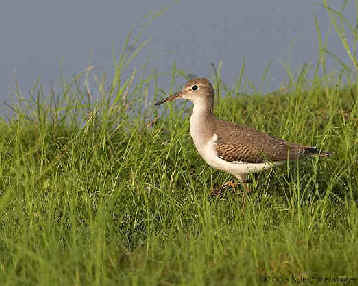
A Spotted Sandpiper in non-breeding
plumage
ARENARIA
- Ruddy Turnstone (ph) (*) _____
RS:oct SE:aug
Arenaria interpres morinella
Outside Brazil, the Ruddy Turnstone has been found during FONT tours in
Argentina, Chile.
CALIDRIS
- Red Knot (ph) (*) ______
RS:oct
Calidris canutus rufa
Outside Brazil, the Red Knot has been found during FONT tours in
Argentina.
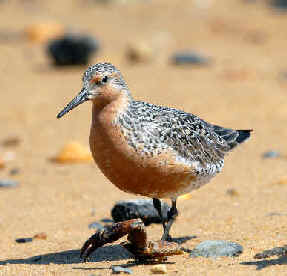
A Red Knot in breeding plumage, as they
can
sometimes be seen in Brazil.
(photo by Howard Eskin)
- Sanderling (ph) (*) ______ RS:jul,oct
SE:aug
Calidris alba rubida
Outside Brazil, the Sanderling has been found during FONT tours
in Argentina, Chile, Venezuela.
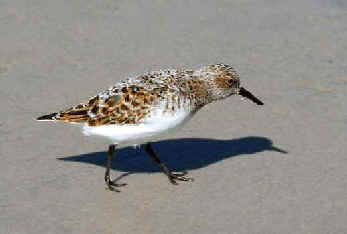
Sanderling
(photo by Howard Eskin)
- Baird's Sandpiper (*) _____
RS:oct
Calidris bairdii (monotypic)
Outside Brazil, the Baird's Sandpiper has been found during FONT tours in
Argentina, Chile, Uruguay.
- White-rumped Sandpiper (ph) (*) ______
RS:oct
Calidris fuscicollis (monotypic)
Outside Brazil, the White-rumped Sandpiper has been found during FONT tours
in Argentina, Chile.
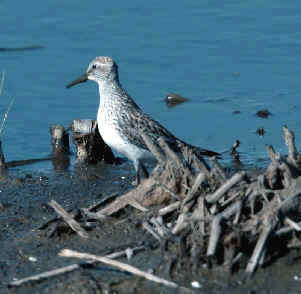
White-rumped Sandpiper
(photo by Howard Eskin)
- Least Sandpiper (ph) (*) ______
AM:feb,aug
Calidris minutilla (monotypic)
Outside Brazil, the Least Sandpiper has been found during FONT tours in
Argentina (where rare), Chile (far-north), Venezuela.
- Pectoral Sandpiper (ph) (*) ______
MS:aug RS:oct
Calidris melanotos (monotypic)
Outside Brazil, the Pectoral Sandpiper has been found during FONT tours in
Argentina, Chile, Uruguay, Venezuela.
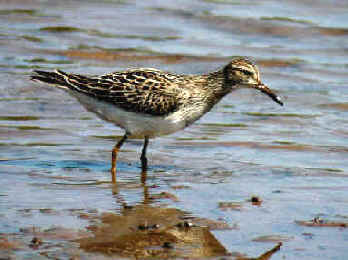
Pectoral Sandpiper
(photo by Howard Eskin)
- Stilt Sandpiper (*) ______ MS:aug
mt
Calidris (formerly Micropalama) himantopus
(monotypic)
Outside Brazil, the Stilt Sandpiper has been found during FONT tours in
Chile, Venezuela.
- Semipalmated Sandpiper
______
Calidris pusilla
Outside Brazil, the Semipalmated Sandpiper has been found during FONT tours
in Venezuela.
TRYNGITES
- Buff-breasted
Sandpiper (nt) (ph) (*) ______ RS:oct
Tryngites subruficollis (the single member of its genus)
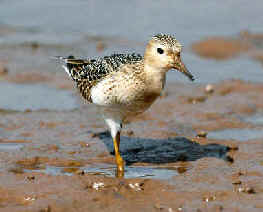
Buff-breasted
Sandpiper
PHILOMACHUS
-
Ruff (ph) ______ (r/BR)
Philomachus pugnax (the single member of its genus)
The Ruff (male) & Reeve (female), a species of mostly
Europe & Africa, has occurred in Brazil as a vagrant, in Rio Grande do
Sul in October 1985.
PHALAROPUS
- Wilson's Phalarope (*) ______
RS:oct
Phalaropus
(formerly Steganopus) tricolor (monotypic)
Outside Brazil, the Wilson's Phalarope has been found during FONT tours in
Argentina, Chile.
- Red Phalarope (ph) ______
Phalaropus fulicarius
Outside Brazil, the Red Phalarope has been found during FONT tours in
Chile (offshore), Iceland.
GLAREOLA
-
Collared Pratincole ______ (r/BR)
Glareola pratincola
The Collared Pratincole has occurred in Brazil as a vagrant,
from the Old World, on the Rocas Atoll, offshore from northeast Brazil, in 1990.
STERCORARIUS
- Parasitic Jaeger (ph) (*) ______
RS:oct (has also been called Arctic Skua)
Stercorarius parasiticus
Outside Brazil, the Parasitic Jaeger has been found
during FONT tours in Chile.
- Long-tailed Jaeger
(ph) ______ (offshore, with records mostly off the seacoast of southeastern
& far-southern Brazil)
Stercorarius longicaudus
Outside Brazil, the Long-tailed Jaeger has been found offshore during
FONT tours in Chile.
- Pomarine Skua (or Jaeger)
(ph) ______ (generally occurs offshore, seasonally, but it has been
recorded on the Amazon & Tapajos Rivers)
Stercorarius pomarinus
Outside Brazil, the Pomarine Skua (or Jaeger)
has been found offshore during FONT tours in Chile.
- Great Skua (ph)
______ (reaches offshore Brazilian waters, more northerly, during
winter in the Northern Hemisphere)
Stercorarius skua
Outside Brazil, the Great Skua has been found during
FONT tours in Iceland.
- South Polar Skua (ph)
______ (reaches offshore & coastal Brazilian waters, more
southerly, during winter in the Southern Hemisphere)
Stercorarius maccormicki
Outside Brazil, the South Polar Skua has
been found during FONT tours in Chile.
- Subantarctic (or Brown)
Skua ______ (has been found in Brazilian offshore waters)
Stercorarius antarcticus
Outside Brazil, the Subantarctic (or Brown) Skua has
been found during FONT tours in Chile.
- Chilean Skua (ph) ______
(has been found in Brazilian offshore waters)
Stercorarius chilensis
Outside Brazil, the Chilean Skua has been found during FONT tours in
Chile.
LARUS
- Kelp Gull (ph) (*) ______ RS:jul,oct SE:mar,may,jul,aug,oct (has been called Domincan Gull
in Australia
& Africa)
Larus d. dominicanus
Outside Brazil, the Kelp Gull has been found during FONT tours in
Argentina, Chile, Uruguay.
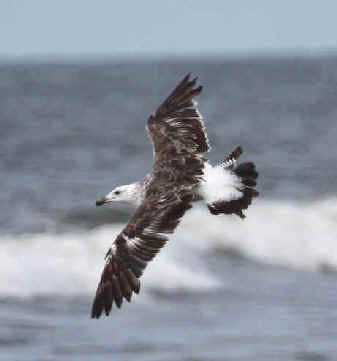
An immature Kelp Gull photographed during
a FONT Brazil Tour
in Rio Grande do Sul
- Olrog's Gull (t3) (*) ______
RS:oct
Larus atlanticus (monotypic)
- Gray-hooded Gull (ph) (*) ______
RS:jul,oct
Chrolcocephas
(formerly Larus) c. cirrocephalus
Outside Brazil, the Gray-hooded Gull has been found during FONT tours in
Argentina.
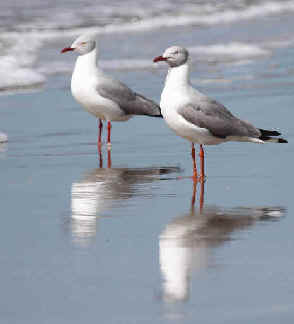
Gray-hooded Gulls
- Brown-hooded Gull (ph) (*) ______
RS:jul,oct
Chrolcocephas (formerly Larus) maculipennis
(monotypic)
Outside Brazil, the Brown-hooded Gull has been found during FONT tours in
Argentina, Chile, Uruguay.
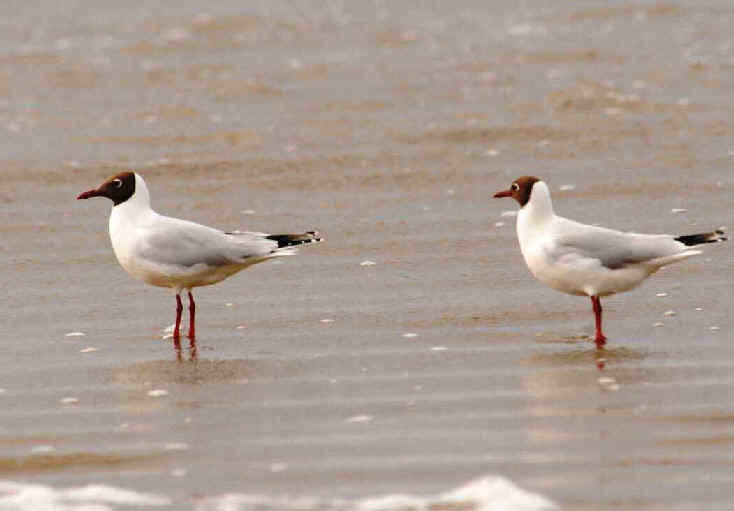
Brown-hooded Gulls
- Ring-billed Gull (ph)
______ (has occurred as a vagrant as far south as Amazonian Brazil)
Larus delawarensis
- Laughing Gull (ph)
______ (occurs as a rarity in northern Brazil, but there is 1 record
from Rio Grande do Sul in far-southern Brazil)
Leucophaeus
(formerly Larus) atricilla
Outside Brazil, the Laughing Gull has been found during FONT tours in
Chile (far-north), Venezuela.
- Franklin's Gull (ph)
______ (has occurred as a vagrant in Amazonian Brazil and on the
Fernando de Noronha islands offshore from northeast Brazil)
Leucophaeus
(formerly Larus) pipixcan
Outside Brazil, the Franklin's Gull has been found during FONT tours in
Chile.
GELOCHELIDON
- Gull-billed Tern (*) ______ RS:oct
Gelochelidon nilotica
Outside Brazil, the Gull-billed Tern has been found during FONT tours in
Argentina, Venezuela.
STERNA
- Snowy-crowned Tern (ph) (*) ______
RS:jul,oct (has also been called Trudeau's Tern)
Sterna trudeaui (monotypic)
Outside Brazil, the Snowy-crowned Tern has been found during FONT tours in
Argentina, Chile.
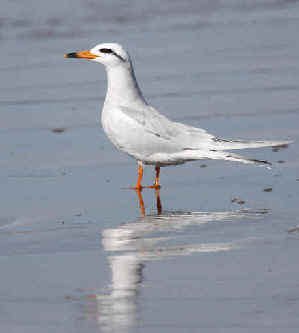
A Snowy-crowned Tern photographed during the FONT Brazil tour
in Rio Grande do Sul in
October 2009
- South American Tern (ph) (*) ______ RS:jul,oct SE:may,aug
Sterna hirundinacea (monotypic)
Outside Brazil, the South American Tern has been found during FONT tours in
Argentina, Chile.
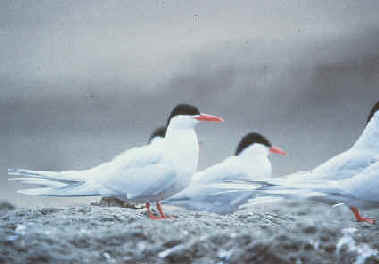
South American Terns
(photo by Armas Hill)
- Antarctic Tern (*) ______ RS:oct
SE
(offshore)
Sterna vittata
- Common Tern (*) ______
RS:oct SE:aug
Sterna h. hirundo
Outside Brazil, the Common Tern has been found during FONT tours in
Argentina, Chile.
- Arctic Tern ______ (seasonally offshore)
Sterna paradisaea
- Roseate Tern (ph) ______
Sterna dougallii
Outside Brazil, the Roseate Tern has been found during FONT tours in
Venezuela.
- Forster's Tern (ph) ______
(a single record along the northeast Brazil seacoast in the 19th Century;
not since)
Sterna forsteri
PHAETUSA
- Large-billed Tern (ph) (*) ______
AM:feb,aug MS:mar,aug,sep mt
RS:oct SE:aug
Phaetusa simplex chloropoda (the single
member of its genus)
Outside Brazil, the Large-billed Tern has been found during FONT tours in
Argentina, Ecuador, Venezuela.

Large-billed Terns photographed during a
FONT tour in Brazil
STERNULA
- Yellow-billed
Tern (*) ______ af AM:feb,aug mt
RS:jul,oct SE:aug (has
also been called Amazon Tern, but not restricted to
that basin)
Sternula (formerly Sterna) superciliaris
(monotypic)
Outside Brazil, the Yellow-billed Tern has been found during
FONT tours in Argentina, Ecuador, Venezuela.
- Least Tern ______ (in
northern Brazil, along the seacoast)
Sternula
(formerly Sterna) antillarum
THALASSEUS
- Cayenne Tern (*) ______ RS:jul,oct SE:aug (was considered conspecific with the
more-northerly Sandwich Tern)
Thalasseus
(formerly Sterna)
eurygnatha
Outside Brazil, the Cayenne Tern has been found during FONT tours in
Argentina.
- Royal Tern (ph) (*) ______ RS:jul,oct SE:jul,aug
Thalasseus
(formerly Sterna) m. maxima
Outside Brazil, the Royal Tern has been found during FONT tours in
Argentina, Venezuela.
- Sandwich Tern (ph) ______
Thalasseus
(formerly Sterna) sandvicensis
Outside Brazil, the Sandwich Tern has been found during FONT tours in
Chile (far-north).
ONYCHOPRION
- Sooty Tern (ph) ______ (breeds on Rocas Atoll
and the Fernando de Noronha islands off the coast of northeast Brazil; has
been seen at the mouth of the Amazon River)
Onychoprion fuscatus
ANOUS
- Brown Noddy ______
Anous stolidus
- Black Noddy ______ (occurs, as a breeder, on islands offshore from northeast Brazil)
Anous minutus
RYNCHOPS
- Black Skimmer (ph) (*) ______ af AM:feb,aug MS:aug,sep mt
RS:jul,oct SE:aug,oct
Rynchops nigra intercedens
Outside Brazil, the Black Skimmer has been found during FONT tours in
Argentina, Bolivia, Chile, Venezuela.
PATAGIOENAS
- Scaled Pigeon (*) ______ af,mt
Patagioenas (formerly Columba)
speciosa
(monotypic)
- Picazuro Pigeon (*) ______ br IG:jul,sep MN:mar,may,aug,sep,oct MS:mar,aug,sep,oct
mt RS:jul,oct SE:mar,may,jul,aug,oct
Patagioenas (formerly Columba)
p. picazuro
Outside Brazil, the Picazuro Pigeon has been found during FONT tours in
Argentina, Paraguay.
- Spot-winged Pigeon (*) ______
RS:oct
Patagioenas
(formerly Columba)
m. maculosa
Outside Brazil, the Spot-winged Pigeon has been found during FONT tours in
Argentina, Uruguay.
- Pale-vented Pigeon (*) ______ af AM:feb,aug ig MN:may,oct,sep MS:mar,aug,sep
mt RS:oct SE:mar,aug,oct
Patagioenas (formerly Columba)
cayennensis sylvestris
Outside Brazil, the Pale-vented Pigeon has been found during
FONT tours in Argentina, Bolivia, Ecuador, Venezuela.
- Plumbeous Pigeon (*) ______ AM:feb,aug MN:may,sep,oct SE:may,aug,oct
Patagioenas (formerly Columba)
p. plumbea
Outside Brazil, the Plumbeous Pigeon has been found during FONT
tours in Ecuador, Venezuela.
- Ruddy Pigeon (t3) (*) ______ af AM:feb,aug mt
Patagioenas (formerly Columba)
subvinacea bogotensis
Outside Brazil, the Ruddy Pigeon has been found during FONT
tours in Ecuador, Venezuela.
- Band-tailed Pigeon
______ (in far-northern Brazil)
Patagioenas
(formerly Columba) fasciata
Outside Brazil, the Band-tailed Pigeon has been found during FONT tours in
Venezuela.
COLUMBA
- Common (or Feral) Pigeon (i) (*) ______ AM:feb,aug br IG:jul,aug
MN:mar,may,aug,sep,oct MS:mar,aug,sep,oct
mt RS:jul,oct SE:mar,may,jul,aug,oct
Columba livia
Outside Brazil, the Common (or Feral) Pigeon has been found during FONT
tours in Argentina, Bolivia, Chile, Paraguay, Venezuela.
ZENAIDA
- Eared Dove (ph) (*) ______ af ES:oct IG:jul,aug MN:mar,aug,sep,oct MS:mar,aug,sep
mt RS:jul,oct SE:mar,jul,aug,oct
Zenaida auriculata virgata
Outside Brazil, the Eared Dove has been found during FONT tours
in Argentina, Bolivia, Chile, Paraguay, Uruguay, Venezuela.
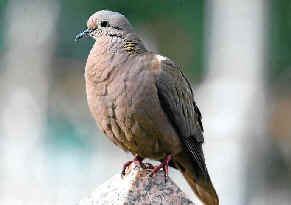
An Eared Dove photographed during a FONT
tour
COLUMBINA
- Common Ground Dove (ph) (*) ______
AM:feb,aug
Columbina passerina griseola
Outside Brazil, the Common Ground Dove has been found during FONT
tours in Venezuela.
- Plain-breasted Ground Dove (*) ______ ig
MN:may,sep,oct MS:mar,aug mt SE:jul
Columbina m. minuta
Outside Brazil, the Plain-breasted Ground Dove has been found during FONT
tours in Paraguay, Venezuela.
- Ruddy Ground Dove (ph) (*) ______ af AM:feb,aug br ES:oct IG:sep
MN:mar,may,aug,sep,oct
MS:mar,aug,sep,oct mt RS:jul,oct SE:mar,may,jul,aug,oct
Columbina t. talpacoti
Outside Brazil, the Ruddy Ground Dove has been found during
FONT tours in Argentina, Bolivia, Ecuador, Paraguay, Venezuela.
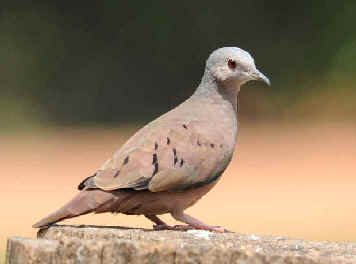
Ruddy Ground Dove
- Picui Ground Dove (*) ______ ig MN:sep MS:mar,aug,sep,oct mt
RS:jul,oct SE:mar
Columbina p. picui
Outside Brazil, the Picui Ground Dove has been found during FONT tours in
Argentina, Bolivia, Chile, Paraguay, Uruguay.
- Scaled Dove (ph) (*) ______ br MN:mar,may,aug,sep,oct MS:mar,aug,sep,oct
mt
Columbina s. squammata
Outside Brazil, the Scaled Dove has been found during FONT tours in
Bolivia, Paraguay, Venezuela.
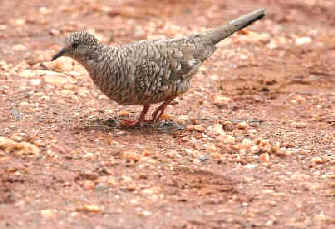
A Scaled Dove photographed during a FONT Brazil
Tour in March 2008
(photo by Marie Gardner)
- Blue-eyed Ground Dove
(t1) ______
Columbina cyanopis
UROPELA
- Long-tailed Ground Dove (*) ______ MS:mar,aug,sep,oct mt
Uropela campestris figginsi (until recently treated as monotypic) (the single member of its genus)
CLARAVIS
- Blue Ground Dove (*) ______ af IG:sep MN:may MS:aug,oct mt
Claravis preiosa (monotypic)
Outside Brazil, the Blue Ground Dove has been found during FONT
tours in Ecuador, Venezuela.
- Purple-winged Ground Dove (t1) (*) ______ MN:oct
Claravis godefrida
LEPTOTILA
- White-tipped
Dove (*) ______ af AM:feb,aug br
ES:oct IG:jul,aug,sep MN:may,sep,oct MS:mar,aug,sep,oct mt RS:jul,oct
SE:jul,aug,oct (has
been called White-fronted Dove)
Leptotila verreauxi decipiens
Outside Brazil, the White-tipped Dove has been found during FONT
tours in Argentina, Bolivia, Ecuador, Paraguay, Venezuela.
- Gray-fronted Dove (*) ______ af AM:aug br MN:oct MS:aug,sep
mt SE:aug
Leptotila rufaxilla reichenbachii
Outside Brazil, the Gray-fronted Dove has been found during
FONT tours in Argentina, Ecuador, Venezuela.
GEOTRYGON
- Ruddy Quail-Dove (*) ______ af AM:feb MN:oct mt
SE:jul,aug,oct
Geotrygon m. montana
Outside Brazil, the Ruddy Quail-Dove has been found during FONT
tours in Ecuador, Venezuela.
- Violaceous Quail-Dove (*) ______ IG:aug
MN:may
Geotrygon violacea
Outside Brazil, the Violaceous Quail-Dove has been found during FONT tours
in Argentina.
- Sapphire Quail-Dove (t3) ______ (in far-western Amazonian Brazil)
Geotrygon saphirina
Outside Brazil, the Sapphire Quail-Dove has been found during FONT tours in
Ecuador.

To
Top of Page.



 Brazil
Birds
Brazil
Birds
















































































![]()